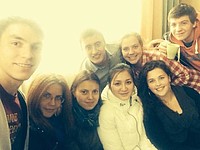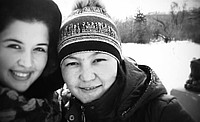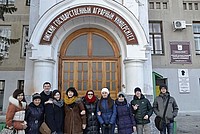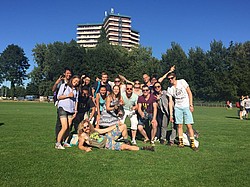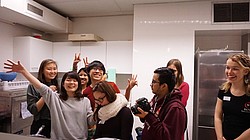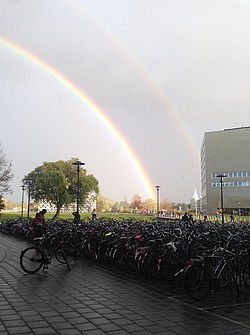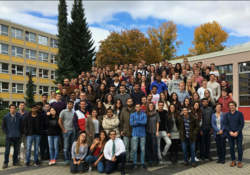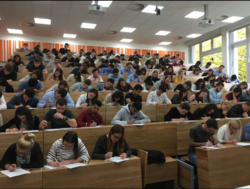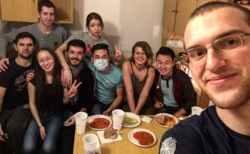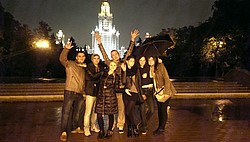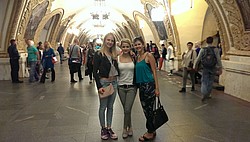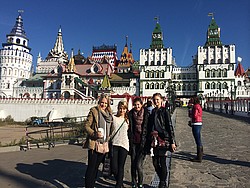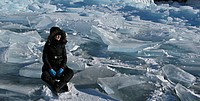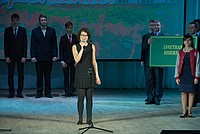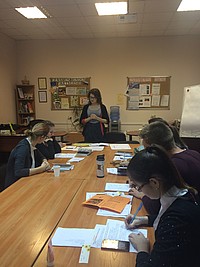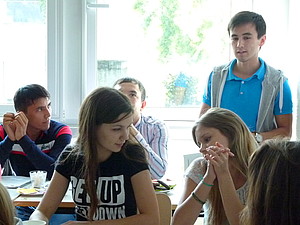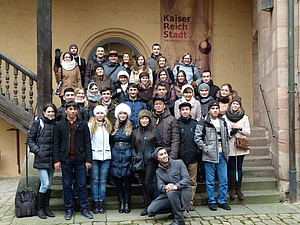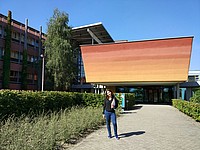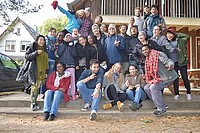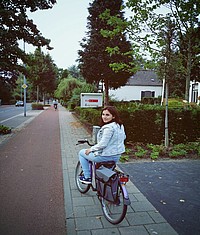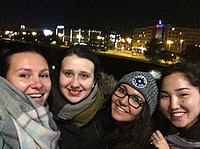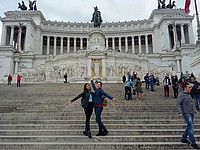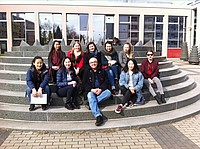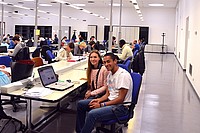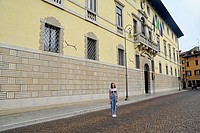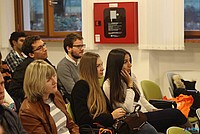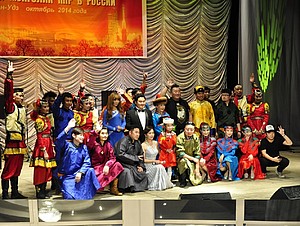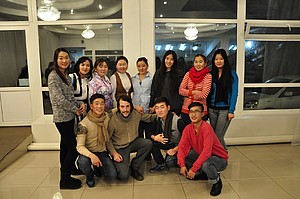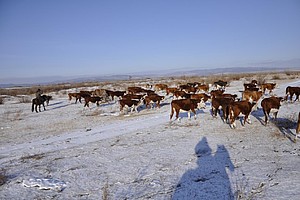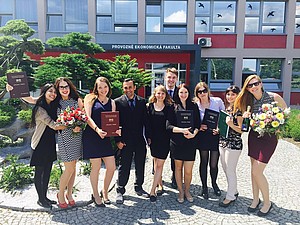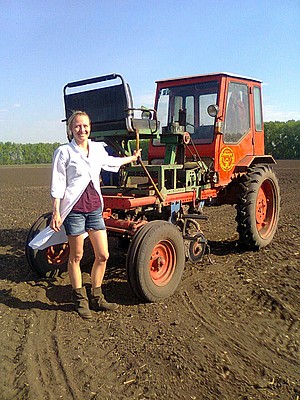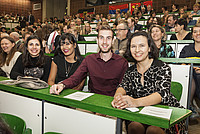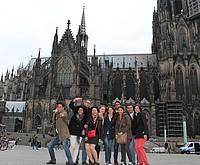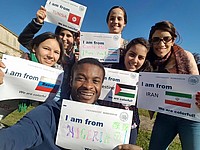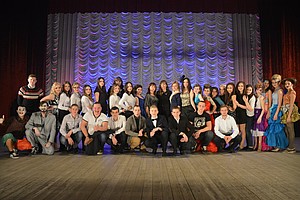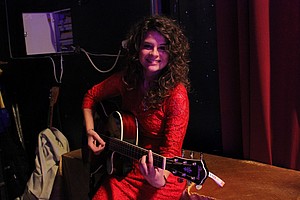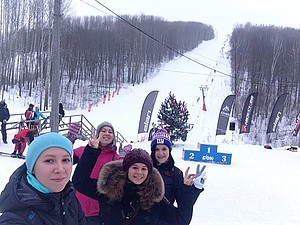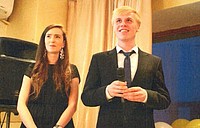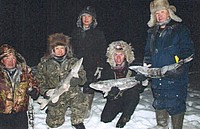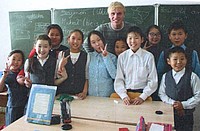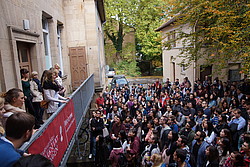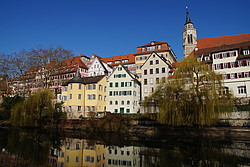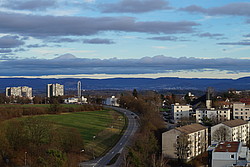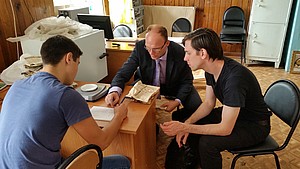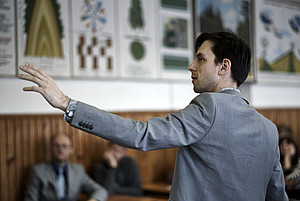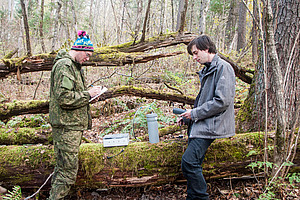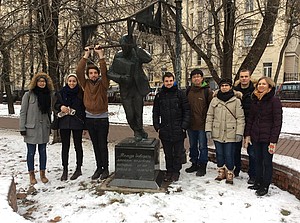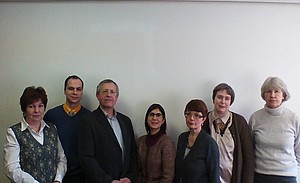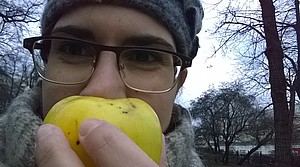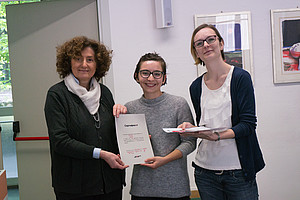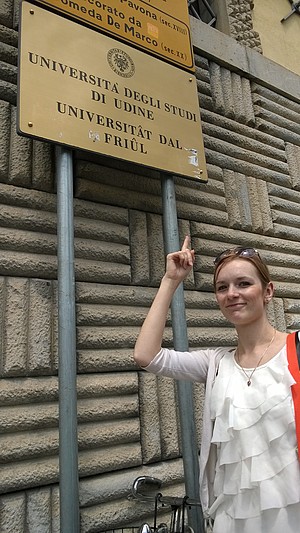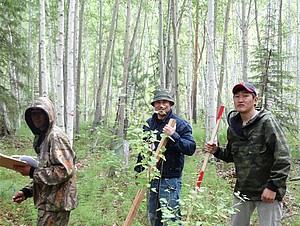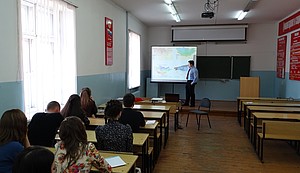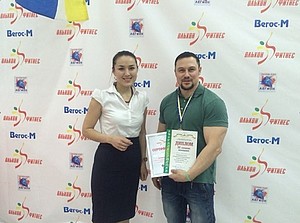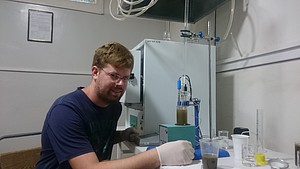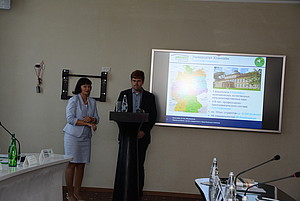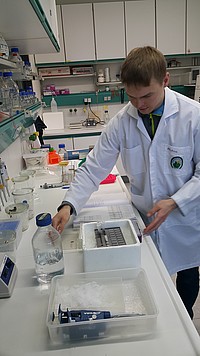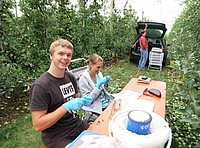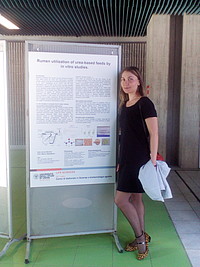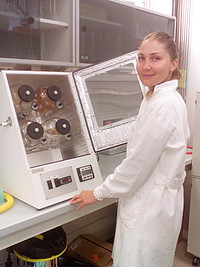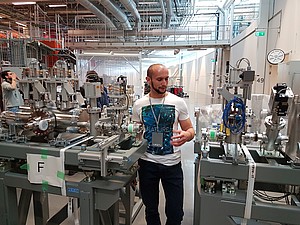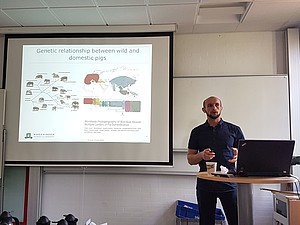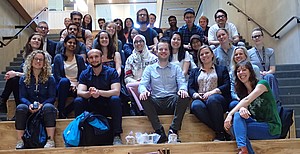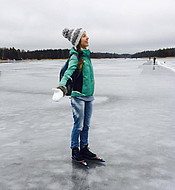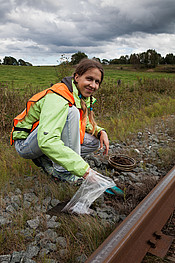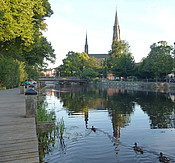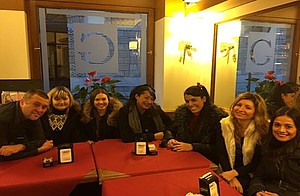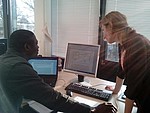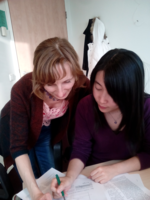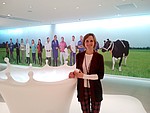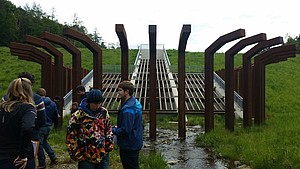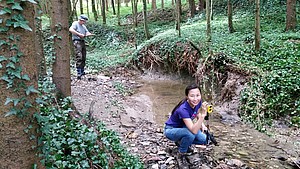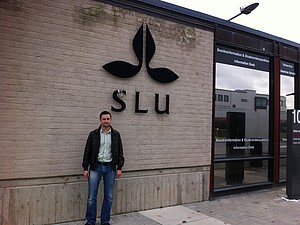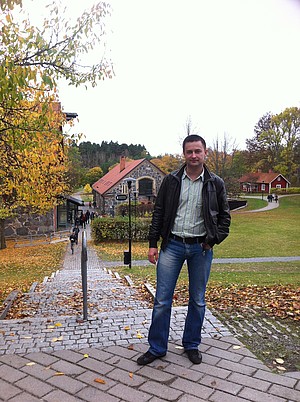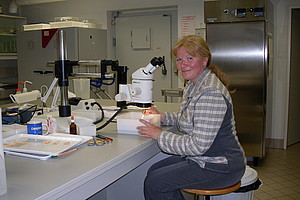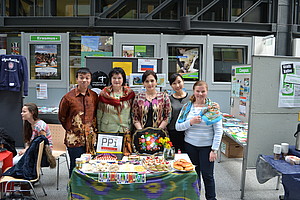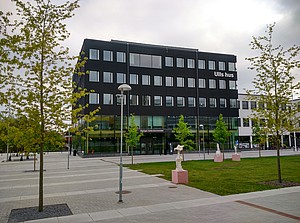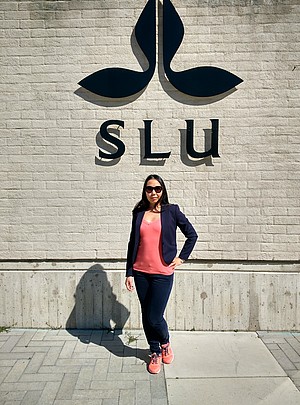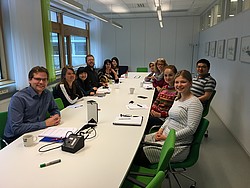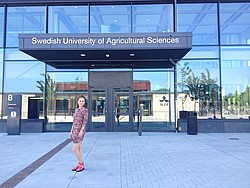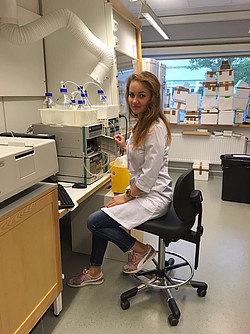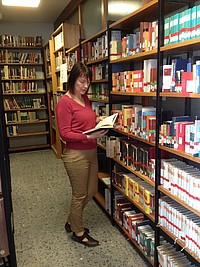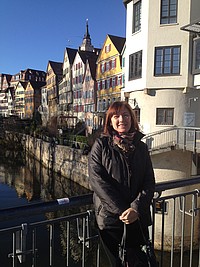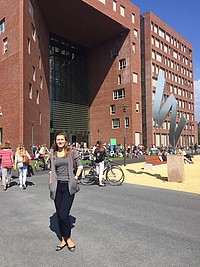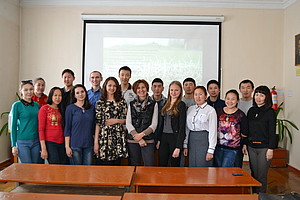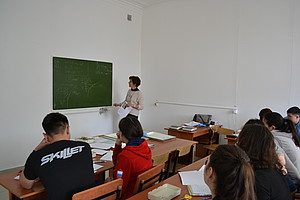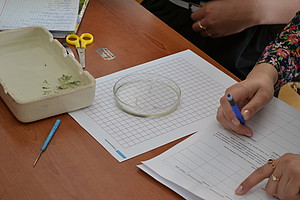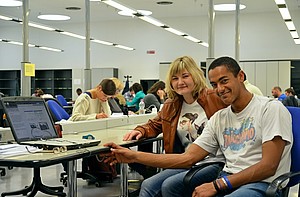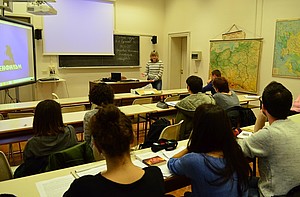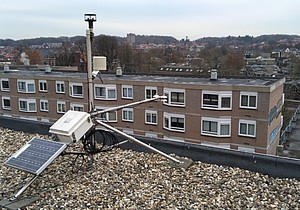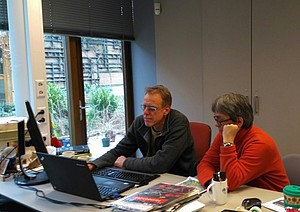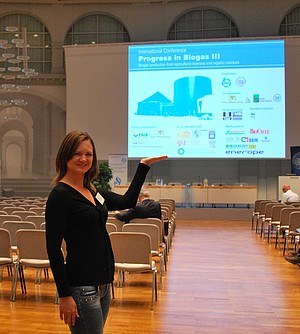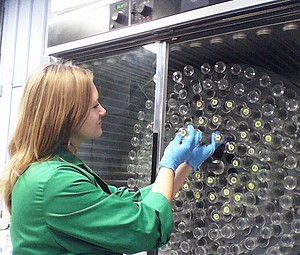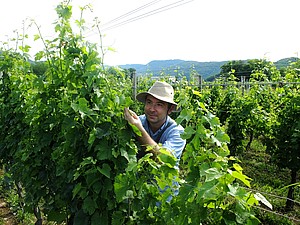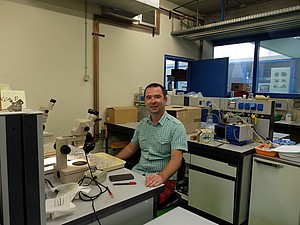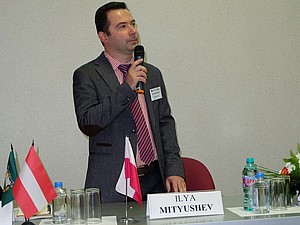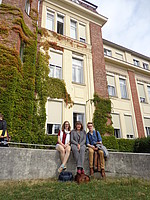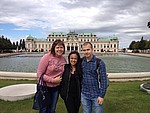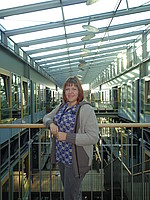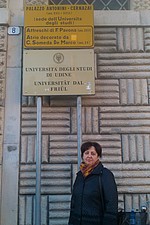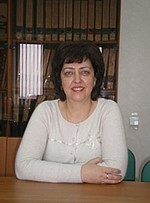Success stories
On this page you can find a selection of success stories of IAMONET-RU V grantees. The provided reports in English, German and Russian include academic accomplishments, research activities, infomation on professional development, personal impressions as well as photos.
Bachelor, 6 months - WS 2014-2015 at Omsk State Agrarian University
I had been studying at the Omsk State Agrarian University for six months. Here I attended four courses in Russian language: Philosophy, Economics, Law and Russian Linguistic. During this period I also wrote a fundamental part of my final dissertation. This experience gave me the possibility to improve my Russian and to enrich my knowledge about Russian culture, habits and society.
According to my direct observation, EU and RU university life differs in many aspects. The main divergence consists of the approach and of the relationships established among students. As a matter of fact, the Russian higher educational system encourages students to be altruistic through a promotion of volunteering and a creation of care centres for people in need. I had the immense honor of participating in volunteer activities that consisted in visiting old-age people in some geriatric centers, playing with groups of children in an orphanage and working for a campaign against alcoholism.
It was such an amazing and different Erasmus experience: normally, I meet young people from Spain, England, France, Germany, but in Omsk I shared my life with students from Kazakhstan, Kyrgyzstan, Mongolia and Russia, of course. They became my friends and they are still part of my present life.
Living in Russia, and in particular in Omsk, is a real life experience that improves your surviving skills: all the certainties you have collapse and you have to recreate yourself. At the end of the mobility everything in you and around you is changed and you will not be the same person again. Despite the help of professors, friends and referents, I tried to do everything on my own and realizing that I was actually able to make it, could not make me happier. Today I can say that I am a more self-confident person and I know that I had a kind of adventure that I will never forget. If I have the chance, I will certainly apply again for IAMONET-RU.
Bachelor, 6 months - WS 2016-2017 at Wageningen University
The opportunity to study in Europe was always a great chance to get new knowledge and to look at a university life from a different perspective. Therefore, I could not miss a chance to take part in IAMONET-RU mobility program. I applied for the grant within Target group 3 since I belonged to an indigenous population. And a whole acceptance process was quite challenging and took a long time. But the result was worth all the effort. Wageningen University in the Netherlands was my first priority.
The next step was to get accepted into the university itself, which was a lot more difficult than I expected. My major was architecture and urban planning and I had to change course preferences many times since my background knowledge did not correspond to European ones or was not enough. However, we found a way to sign a learning agreement.
Most of the courses were related to environmental sciences - Environmental management and Industry, Introduction to leisure, tourism and environment and others are more from planning - Planning theory and ethics, Planning for urban quality of life and Introduction to GIS. 6 ECTS credits each, 30 ECTS credits in total. I must say that I really enjoyed these subjects. Even though, they were not all about urban planning and architecture, I had a chance to perceive how all these are important and interconnected with each other. I would never have a chance like this to gain all the possible knowledge I can if there were not these multidisciplinary courses.
Dutch education system completely differs from the Russian system. In Wageningen University we studied 2 courses per period which takes around 2 months. This system was very convenient for me. At the end of each period there are only two exams which you can pass without any pressure and stress from other courses. But the 3rd period consisted only of one full day course. As for me, I think this way of studying gives you more time and power to immerse into subjects.
Moreover, I found classes at Wageningen University very interactive and fruitful in discussions and opinions. Local and other foreign students were absolutely inspiring for me. They all were strongly motivated and active during school time and I have never experienced such a close communication between professors and students.
Student's life here was quite lively - from quiet cultural events to loud drinking Thursdays. At the very beginning, we enjoyed AID (Annual Introduction Days),after that, we could split up and join any other variety of students' organizations and circles. And as a tradition, I joined International Students' Organization of Wageningen. One more exciting thing is cycling - the nicest way of transportation within this small town and even between the cities. There is a feeling that Dutch lifestyle is super active and productive.
All 6 months experience is full of amazing memories that I will neither forget nor regret. I would like to thank IAMONET-RU mobility program for giving us this chance to experience this students' life in the Netherlands. I am sure that the knowledge that we gained here is going to help our academic future and career.
Bachelor, 6 months - WS 2016-2017 at Czech University of Life Sciences Prague
I was very happy to get this incredible opportunity. My lucky chance was the Czech Republic. I have never been abroad and Prague was too amazing for someone who haven't seen anything before.
There are a lot of foreign students and teachers in the Czech University of Life Sciences. When you communicate with people from other countries, you become open-minded. I have definitely learned more about life.
Concerning my study, I was free to choose 7 subjects on my own and I took English for Business purposes, Marketing Management, International Trade, Human Resources Management, Essentials of Diplomacy, World Economy and Czech Language course. My teachers were from the United States, France and the Czech Republic. In class, we worked mostly in groups. Our teachers always tried to mix students from different countries in one group and speak only English.
I remember when I came to Business English class, I was scared that I won't understand my teacher Edmond Grady from USA. I didn't understand his fluent speech. But the next day, I understood the meaning of some words. The day after, I understood everything! Teachers not from USA aren't native speakers of English and I think that's why I understood them right off.
We lived on campus where everything was close: faculties' buildings, dormitories, cafeterias and clubs. Clubs offered many different events to relax and have some fun with international friends after long hard working day. Especially hard was in the days of study-blocks when you have one subject all day whole week with many homework assignments.
Final examinations were stressful but the most difficult subject was World Economy - this course was for Master's program level students. Erasmus students from Russia and Kazakhstan were allowed to attend this course because our Bachelor education takes 4 years not 3 as in Europe, so therefore we were recognized as Master students.
After exams, we started to travel and I can't believe even now that it was real. Six months of great experience, big challenges, international friendship and beautiful memories. Thank you IAMONET-RU, NEFU and CULS for that!
Bachelor, 6 months - WS 2014-2015 at Moscow State University
My name is Katharina Enders and I am a student from the University of Hohenheim. For my semester abroad within the IAMONET-RU program I chose the Moscow State University. I was free to choose between faculties and courses in advance and got great support during the whole process. During my stay in Russia, in particular from the 1 of September to the 28 of February, I have been studying at the Faculty of Economics as well as at the Philological Faculty and chose following courses: Environmental Management and Economics, International Economics, Free Economic Zones and Offshore Territories, Technical Analysis, Russian language courses: grammar and vocabulary, conversation practice, business communications and Russian "non-traditional" prose.
The range of courses, in English and in Russian, is broad and you get specific Russian courses which helps to improve your Russian skills. The format of courses taught is quite different to those at my home university. Firstly, the duration of courses is significantly shorter - most of the courses last about eight weeks but could be stretched to six or eight hours a week within this period. Secondly, the sizes of groups during the lectures are pretty compact: 10 to 15 students enable a greater participation during the lecture. Attendance, group projects and case studies, as well as students' activity during lectures are considered in grading process.
Although a heavy workload, tests at the end of each lecture are fair and feasible. The professors were always anxious and helpful, when asking for any support. Despite the academic performance, MSU has a structured plan of procedure for incoming exchange students. As soon as you arrive, most of the necessary paperwork that is needed for housing is prepared in the main building. Paying a rent itself is another story: After one hour of standing in a queue, you still have to know what papers to carry with you, otherwise you' d have to run back and get them, losing your place to 30 other students who stood patently behind you. Despite that, you have to pay your rent in advance and in cash.
But when it comes to leisure time, you can never get bored in Moscow. Apart from numerous offered free-time activities, like volleyball, soccer and ice-hockey groups, you are free to join the International Students Club which provides a great opportunity to connect with other exchange students as well as local students. Although speaking Russian as my mother language and having been to the country several times, the experience exceeded all my personal and academic expectations.
Bachelor, 6 months - WS 2015-2016 at Novosibirsk State Agricultural University
During my stay in Novosibirsk I took courses offered by Biological department. Among them there were International cuisine, Child nutrition, Specialized nutrition. Those courses were focused on practical aspects and were conducted in a food laboratory (kitchen). We also had some theoretical classes, for example, Methods of research in the food industry. In November we also took part in Food Exhibition in Novosibirsk Expo Centre.
There are some main differences between my home and host university. The biggest is probably absence of an online student service in NSAU, which creates a lot of additional paper work and bureaucracy. Also at NSAU they had very few exchange students and they were not very familiar with such situation. It was sometimes rather hard to obtain necessary information regarding studies or to receive documents.
At NSAU thanks to Lyubov Schmidt I had a chance to lead English Speaking Club. Through this I met other fellow students and gained additional teaching experience. Also, from the very beginning I was familiar with Polish community and Polish club in Novosibirsk, I actively took part in their events. Those were film shows, workshops, conference and concerts. I also presented one film and led a discussion in the local cinema. Since my friends were interested in Polish language I gave individual classes to them. That was a unique experience of teaching abroad my mother tongue to foreigners. I also made a few presentations about Polish language and culture in youth clubs. This enabled me to meet not only students of NSAU, but also people of different interests and backgrounds in various places in the city. By all this activities I could understand the place where I lived better. It wasn't always easy since I had had a knee surgery in Novosibirsk but thanks to my wonderful Siberian friends I easily got over it.
Since travelling is my passion I visited several Russian cities like Krasnoyarsk, Tomsk, Yekaterinburg, Perm and Irkutsk. I also made a trip with local youth trekking&camping organisation to Altai mountains, where I met fantastic people who were with me during my whole stay in Novosibirsk. Additionally I managed to go to frozen Baikal lake which was an unforgettable experience! Siberian nature is beautiful beyond words. You could spend years exploring this region and you would never get enough. Even though my mobility has finished in February 2016, in October 2016 I had a chance to visit Russia again. I participated in a conference organized by the IAMONET-RU team in Moscow, giving a speech about soft skills development during student exchanges. Of course, I would love to take part in Erasmus Mundus program again if that would be possible!
Bachelor, 6 months - WS 2014-2015 at the University of Hohenheim
I studied as a student of Bachelor of Economics and Business Administration at the University of Hohenheim during the winter semester. The education system in Germany is arranged in a way that before the beginning of the semester students can choose the subjects which they would like to attend. Therefore, before coming to Germany, I already knew my training schedule. At first it was hard to study in English and to understand economic terminology. But after a couple of months I improved the level of my English skills by attending English courses and practicing the language every day.
I would like to highlight some of the features of studing at a European University: students can choose the subjects which they would like to attend by themselves, all lectures can be found on the website of the host university, professors do not check the number of students in the classroom but in spite of the presence of such freedom students are preparing for the exams in the library during the semester. Students relax as efficiently as they learn. During the semester university organized different trips and excursions, themed evenings and meetings, etc.
When I found out the schedule of my exams I was surprised to know that students can take more then one exam in one day or every day. Based on this, I was a little confused and not quite properly apportion my time and energy to prepare for the exams. At the end of my mobility, I was able to pass the subjects such as Economics of Innovation, International Innovation Management and Interorganitaional Negotiation.
Stuttgart has a unique opportunity to study and grow together with a huge number of people from different countries, to learn their culture, values and way of life. Academic exchange met all my expectations and impressed me a lot. I gained invaluable experience in international communication, thus increasing the level of English and German. My studies gave me new knowledge and broadened my horizons. I have got acquainted with German culture, visited many cities and countries of Europe. Friends around the world, emotions, memories, and a rethinking of many attitudes - this program gave me all of this. If I have the opportunity to once again participate in this program I would be happy to use it. And I think everyone should try their hand and try to participate in the program of academic exchange.
Bachelor, 6 months - WS 2014-2015 at Wageningen University
In total I had 8 courses. For the first period I had two courses: Introduction Leisure, Tourism and Environment; Leisure, Tourism and Environment: Concepts and Approaches. The first course provided with a basic understanding of leisure and tourism and how these interact with the natural and built environments. This course was very helpful as it provided the background necessary for further courses on leisure, tourism and environment. During the course we were discussing the impacts of tourism on the environment from economic, social, cultural and environmental perspectives. The lectures were combined with non-standard tasks which helped me to understand how the concepts of sustainable tourism work in life.
The second course provided an overview of social science approaches that inform theory and practice in the academic study of leisure and tourism. By participating in weekly group assignments I learned how to critically examine key social and philosophical issues that shape leisure and tourism knowledge and look at a range of epistemological perspectives and their influence on this field of study. In addition, due to weekly required readings I learned how to classify and critically evaluate written academic literature. Thanks to these courses I was able to look at the studying of tourism field from the new to me point of view. I discovered the concept of sustainable tourism which was unfamiliar to me before. Finally, the knowledge obtained during the courses and thorough preparation contributed to my successful pass of all the exams for the entire mobility.
I believe that valuable knowledge I was given in this field will enable me to conduct a scientific research on that topic back at home university. As for the difference between host and home universities, the main thing I would like to mention is that at Wageningen UR all the academic stuff is very considerate to the opinion of students. Students can on equal terms with professors express their points of view. This is something that I really enjoyed and appreciated during my mobility. Also, during these 9 months I enjoyed not only my studies but also many other extra-curricular activities and events. As for academic activities I took part in some seminars and workshops by Wageningen Writing Lab on academic writing skills which I found helpful by writing the papers. Additionally, I visited some of the sessions on sustainable development since it correlates with my courses.
Besides, as an exchange student I am a member of international student organization; and as a student of Leisure and Tourism program - of Licere study association. Every month/week there are different events arranged by these organizations which I participate in. These include potluck dinners, cinema nights and kitchens of different cultures. I have met a lot of new people and making friends with them I found out a lot of interesting things about their cultures, their countries of origin. For me it is a great opportunity to break all those stereotypes we usually have in mind about different peoples.
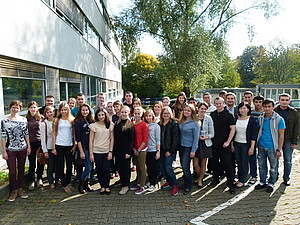
Bachelor, 6 months - WS 2014-2015 at the University of Hohenheim
I was enrolled to the Faculty of Economics and Business Administration. Mainly, the subjects I chose belonged to such fields as Micro- and Macroeconomics, with the only exception - Advanced Negotiation Management. The exams that I passed: Microeconomics, Quantitative Methods in Economics, Interest and Prices, Interorganizational Negotiations. Additionally, I took German (B1.1) and French (B1.1) courses, successfully passed exams and got certificates. All the lectures and tutorials were particularly well structured, very comprehensive and intuitive. Despite the fact that I chose them from different academic levels and majors, there was some very helpful overlapping that promoted understanding.
From the first sight, one can see some rather profound differences between Russian and European education. In Germany I saw very aimed and motivated students highly interested in every subject. System of education here offers much more freedom, but also requires much more responsibility. During my studying I had not a one test at any of my courses except the final exam, but without revising and working at home, preparation for an exam may be very complicated. It is impossible not to notice high professionalism and competence of all the lecturers. Some of them were Ph.D. students (Dipl. oec.) and their lectures were full of the latest developments in a respective areas and intuitive examples.
I consider all the knowledge and experience I have gained as a precious advantage and a huge step towards my successful career in economic sphere. Besides academic experience, I enhanced my skills in independent living, making contacts with international room- and classmates. I enjoyed spending time with people I had met, routine, travelling around Southern Germany, my studies. All this six months were full of challenges, new experiences, self-tests and reflections on the past and the future. One more advantage of this mobility is a chance to see your ordinary life from outside and to try yourself in new circumstances. In my case it gave me an opportunity to set the priorities and goals.
I would definitely advise others to participate in Erasmus programs, actually I always did and I always will. In theory someday I would also apply one more time, but for now I am looking forward to come back and to use all the experience and inspiration I have gained here.
Bachelor, 6 months - WS 2016-2017 at Czech University of Life Sciences Prague
Waiting for the Erasmus Mundus selection results and then preparing for a departure it took me one and a half year, so after I knew that my application was successful and I was going to study in the Czech University of Life Sciences in Prague, I was looking forward very much to the programme beginning.
In CULS I took courses of Bachelor's programme in Economics and Management. Besides I also did language courses which are available for Erasmus students - English for debate, negotiation and business purposes and the Czech language where teachers are so passionate about what they are teaching. One of my best impressions is lectures given by the American ambassador. He is a highly educated person, however absolutely approachable. He taught and motivated us to be more confident in English.
What was really unusual for us, Russian students, is that CULS students have a great freedom in choice of lectures and seminars; they can take any course they think is necessary for them. As for me I had a chance to take a couple of courses on Accounting.
During my studies in Czech University of Life Science Prague I completed 6 courses in total 30 ECTS, 3 of them were in field of marketing. It was absolutely great experience which contributed very much not only to my academic development but also to my English proficiency, self-confidence and social and inter-cultural skills. In our classes we did a lot of group assignments and project work. Mutual support among students during those assignments and projects and equipped with modern technologies classrooms motivated my studies a lot.
The additional bonus was holidays which we could devote to travelling. I enjoyed very much an international tour organised by the University Students' Council when I met so many interesting people and enjoyed beautiful sights of Czechia.
Erasmus Mundus IAMONET RU project was challenging for me but rewarding and life-changing. As many other fellow students I have become more open to new discoveries. For me IAMONET RU became a character-building programme that gives a great impulse to my personal and professional life.
Bachelor, 6 months - WS 2016-2017 at the University of Udine
I attended four courses during the period of my mobility: Electronic Devices and Components, Nanoelectronics and Bioelectronics, Hungarian language and English language.
I successfully passed the examinations and received 30 ECTS. I followed the course of Italian language and the course of pronunciation in Italian language. I took part in the different events organized by the University of Udine, among them: Erasmus Welcome Day Meeting (University of Udine and ESN NASE Association), Conference-concert "Ludwig van Beethoven (1770-1827)" and Educational excursion to firm U-Blox.
Of course, the education system in Italy is totally different. For example, there are only theoretical lectures in Italy, but in Russia students have about 50% of practical and laboratory classes. There is no intermediate examination of students in Italy. In contrary to Italian education system, there are several examinations during a semester in Russia. An examination process is more flexible in Italy than in Russia. For instance, Italian students can choose the date of their exams. Russian students have only one exact examination date.
The Erasmus Mundus Program helps me to develop professionally and personally in future, especially in regard to becoming a good specialist of electrical engineering. It is necessary to notice that the Erasmus Mundus Program helped me to improve the level of my professional knowledge as well as my language skills.
It was a great experience of communication with people from different countries in different languages (Italian, English, Hungarian and German). I got an excellent possibility to share experience in different spheres with different people. I didn't notice any negative aspects during my mobility. I am going to apply again for international projects for further professional and personal development.
Master, 8 months - WS 2015-2016 at Warsaw University of Life Sciences – SGGW
The application process had finally ended and after a few months I received a letter of selection. Later, full of happiness, I landed at the National Airport of Frederic Chopin, met with my so-called buddy (a person who follows you and tries to simplify student life) and soon officially became an exchange student at Warsaw University of Life Sciences - SGGW.
Through exceptional, kind attitude and careful assistance of the university staff I overcame all bureaucratic obstacles. Special thanks to Ewelina Belkiewicz - coordinator from the host university - there is nothing impossible for her.
My learning agreement included such subjects as Public Speaking, Academic report and writing, Small and medium sized enterprises, Economic policy of the EU, International management, Military tourism and Industrial and technical objects. Apart from the subjects listed above, I decided to attend a few more courses, fortunately such opportunity exists at the university and the entire student community is free to choose some additional subjects like French language, Polish language and Social policy of the EU.
High level of education coupled with professional competence surprised me. Interesting materials, international atmosphere and discussions - they will undoubtedly remain in my memory for a long time. Daily student life, two, three and sometimes four lessons per day almost every day unavoidably increased my English language level and developed my professional skills.
Fully equipped university facilities including student dormitory on the campus territory, modern sports center with training hall and tennis courts, broad territory covered in green and plants, marvelous opportunity to spend free time outside with friends making barbeque together won't let you be bored and be lost in the capital of Poland. At the same time, you will face wonderful attitude of the Polish nation towards foreigners.
Despite the fact that my study obligations included 9 subjects, I easily found free time for other activities. I have an opportunity, provided by this report, to sincerely thank the organization called "ESN". A major part of cultural events is created with their close participation and assistance.
In terms of my type of mobility I was supposed to spend 2 months doing an internship in a company based in Poland. Since my specialization is connected to foreign economic relations I found it relevant to have work experience in an international company. "Ice Day Cream" kindly agreed to hire me for two months internship for the position of summer intern for interaction with foreign clients.
This company is well-known in Poland and across the Europe and has structural units in such countries as Belarus, Ukraine, Italy and France. IDC produces and distributes ice cream mixes since 1988 which makes it one of the oldest companies in the region. I am very grateful to have obtained work experience abroad and have no doubts that it will contribute to my career in Russia.
Amazing things happening to you have a tendency to end and unfortunately my international exchange student mobility was also coming to its coherent final. I haven't ever regretted that I'd choose this path to follow. This opportunity - to be, live and study in Poland - certainly has become one of the brightest moments of my life.
I was grateful to present my country abroad. I hope I succeeded in my intentions and the international educational community, represented here by the Warsaw University of Life Sciences and the University of Hohenheim, isn't disappointed in the choice it once did.
I would like to conclude my report as follows: don't be frightened, don't doubt. Contrariwise - be brave, be motivated. Go ahead!
Master, 6 months - WS 2014-2015 at Buryat State Academy of Agriculture
After I received the selection results I was really happy. I decided just to accept it and to start my mobility in October 2014. I thought about which type of transport I want to take. Later I found out that I can make a train journey from Moscow to my destination Ulan-Ude, Buryatia. I was going there by the typical Russian train on the famous Trans Siberian Railway. In the train I also had already some chance to practice my Russian. In 2009 I visited some Russian language course and in 2014 I did an intensive course for two weeks which helped me a lot to start a conversation. When I arrived at Buryatia, my roommate and one person from the International Office of the Buryat State Academy of Agriculture had already awaited me at the train station.
My dormitory was nearby the academy and was quite cheap. I had a double room together with one roommate. It costs about 30 € per month including the Internet and other facilities. Washing facilities were used by all people on the floor.
Besides my academic life I had time to do some sports at the academy and privately. I was sometimes playing volleyball with other exchange students and I went climbing. I also had a chance to go for two mountain trips with local mountaineers.
At the university I studied Russian and visited some lectures and seminars of my specialization. As I study Organic Agricultural Systems at the University of Natural Resources and Life Sciences in Vienna I visited courses on this specification. Besides general courses on Organic Agriculture I also passed a course on "Ecology and Biology of Weeds" and "Animal Production in Organic Agriculture". For those courses I had to do some presentations about the topic which was agreed on with the lecturers.
Furthermore there was a chance to take part in a conference where different stakeholders in Siberian agriculture did presentations about the current situation in agriculture in Russia. This conference also included the possibility of visiting different livestock farms in Buryatia which gave some insight into the problems and possibilities of development of agriculture in this region.
The staff from the International Office also organized some events and excursions for me and other foreign students from China or Mongolia. Also a private farm visit was organized.
It was a good decision to take this chance to see another reality and a different life in another part of the world. Besides cultural exchange and improvement of my Russian language skills I also gained a lot of other soft and hard skills. I met a lot of good people and I was lucky not to have big problems. Also the managing processes at the host university were organized in a great way. Everybody helped me if some difficulties appeared. Thus I want to say also a big "Thank you" to the staff from the International Office of Buryat State Academy of Agriculture. I will always remember these 6 months in Russia.
I made a lot of friends from different cultural background. I also had a chance to travel around in Mongolia and Buryatia. All in all I can just recommend everybody to go for an exchange semester to Buryatia. But just don't expect the same life as in central Europe. Life is different in other parts of the world, if you are aware of this, go for it.
Master, 24 months - starting WS 2014-2015 at Czech University of Life Sciences Prague
After being awarded with Erasmus Mundus scholarship for Master students I have started my studies in Autumn semester 2014/2015 in Czech University of Life Sciences on Faculty of Economics and Management under supervision of Jaromir Nemec who is a head of The International Relations Office in the university and who took care of all Erasmus Mundus students and helped me with all queries during whole Master Program.
I am very glad that I had such a great opportunity to be a part of Erasmus Mundus Program; it gave me a chance to study abroad where the approach to teaching is completely different, not to mention it was an incredible experience to study with people from all over the world, for example, Spain, USA and Nepal.
Studying in CZU was very engrossing, every semester we had group projects for all subjects and defended it to get credits. For example, it was a quite interesting project for Strategic Management where we explored brewing industry in the Czech Republic and did the research by survey with questionnaires. Also there was such a new thing for me as Study Block; Lecturer from another country arrives to teach a group of students for a certain subject during whole week whereas other lessons are cancelled. The most exciting for me was Economic Policy study block which was provided by Bill O`Brien from US where we learned how to achieve macro and microeconomic goals by Monetary policy model and economic model, we used special tools to see what will happen if, for example, government decides to increase indirect taxes. Besides of all in the first semester there was a team-building in Kostelec organized by our university for every group, we lived together in a castle whole week and had lessons as well as excursions around the city. At the end of the program I successfully passed state exams and defended my Diploma Thesis "Economic analysis of Apple Inc." where I did a technical and fundamental analysis of the company.
Student's life during this program was incredible. There were held different conferences where you can easily take part, special Czech language lessons for Erasmus students and moreover there was university club "Buddy Go" which arranges various events for students such as *Evening of Portuguese culture* or trips to sights around the Czech Republic. During vacations I with lots of other Erasmus students went to different Czech amazing places, one of them was Adršpach-Teplice Rocks, terrific nature with breath-taking views. Czech Republic is a country with its unique traditions and cuisine which I really did like and thanks to Erasmus Mundus Program I was lucky to discover not only one country but people and cultures of at least 20 countries from various continents. I am very grateful to Ing. Petr Procházka, MSc, Ph.D. who was my supervisor for Diploma Thesis for his professional guidance and recommendations, also all professors from Czech University of Life Science who taught me and did significant contribution to the improvement of my knowledge and whole IAMONET Project for my personal development. I am very happy that I was granted to be a part of Erasmus Mundus Program and very appreciate this opportunity. It was the most exciting time in my life! Thank you IAMONET!
Master, 6 months - SS 2016 at Novosibirsk State Agrarian University
During my exchange semester at the University of Novosibirsk I attended the following courses: Foreign Language, Environmental Geochemistry of Landscape, Biological Plant Protection, Landscape Science, Geography of Soils, Landscape Planning, Environmental Protection and Resource Management as well as Culturology. I missed the first one and a half months lecture in Novosibirsk based on the examination dates in Germany. Therefore, I wrote and passed the following exams: Foreign Language, Environmental Geochemistry of Landscape, Biological Plant Protection and Landscape Science. Further academic achievements are several assignments and a three-month internship at the Institute of Plant Breeding of the State of Novosibirsk. I completed my internship with a scientific report. Forthermore, I took part in a conference for young scientists in Barnaul with a presentation and an article published in their proceedings.
I actively participated in the academic life and gained interesting and essential experience during my stay. The universities are structured in a classes in contrast to the course system of German universities. A student identifies himself stronger with the group and experiences a better sense of team spirit and mutual support. The relationship between teachers and students is closer than in Germany. This motivates students to ask questions more often and increases participation in lectures. Lessons are read without any visual support like e.g. presentations. Thereby, students have to continiously think along and take notes. However, visual presentations can possitivly contribute to the learning effect.
During my studies I have found very few online learning materials for home studies. Also, the bureaucracy at the university still requires a lot of paper work, therefore it is time consuming and complicated. Practical hands-on courses and excursions are offered by the teachers during the vacations. This is great to give theoretical knowledge a practical background.
The direct and open contact to the teacher, the team spirit in the classroom and the helpful classmates made a very positive impression on me. If I had any problems in understanding of the teaching content or certain procedures, I could always consult my classmates or even the teacher. The contact between the colleagues and supervisors at the Institute of Plant Breeding was also very helpful and cooperative. I gained valuable insights into working methods at a Russian institute through this internship.
Master, 24 months - starting WS 2014-2015 at the University of Hohenheim
After applying for a Master study program Environmental Protection and Agricultural Food Production I was accepted for it and started my studies in the winter semester 2014/2015. The title of the program fully corresponds with its contents: the list of compulsory and semi-elective modules includes subjects from "environmental" field (e.g. Ecotoxicology, Spatial Data Analysis with GIS), as well as from food production field (e.g. Food Technology, Food Safety and Quality Chains).
I was satisfied with the provided variety of modules. As elective modules students are free to choose any of all study programs. Here I took an advantage of knowing the German language and have participated in two modules held in German, as both of them have no analogous modules in English.
During staying at Hohenheim I participated in a number of excursions: "Agricultural Organizations: From Global to Local" in Bonn/Rhineland, to a waste incineration plant, small-scale hydropower station, which might be relevant for my future career. During three whole semesters I completed 18 courses with total 90 ECTS, one additional course at the University of Stuttgart, 5 German courses and one French course. In the fourth semester I proceeded to write a master thesis "Urban Sector Analysis in Frankfurt/Main, Germany", and submitted it in October 2016.
Though studying methods at Hohenheim differ from those at MSU it was not very difficult to get used to a new system, because of the favorable environment (libraries, rooms for studying and group works and support of fellow students). Writing a seminar paper, preparing seminar talks and learning for exams without having a list of questions - those were the major challenges.
One of the most valuable acquisitions of my stay abroad is an acquaintance with Germans and their lifestyle. Germans are really accurate and strict. Their life is scheduled one year in advance, making an appointment is crucial in all cases. At the same time they know how to relax and spend free time and money. There are a number of big and local festivals, street markets and parades taking place all year round. Staying fit is another feature forcing people doing sports. From German's lifestyle I learned and liked hiking, cycling and jogging.
To conclude, my stay at Hohenheim during 24 months incredibly contributed to my personal and academic development. If I had a chance to apply for IAMONET again, I would immediately do this.
Remark: this story was posted to show how immense the improvemt of Russian language competense was during Ms Tessaro's stay and studies in Russia. The translation is provided by the University of Hohenheim.
Master, 6 months - WS 2015-2016 at Samara State Agricultural Academy
Время летит, и вдруг я закончила мою стажировку в России, в великолепном и известном поселке Усть-Кинельский.
Что сказать, с меланхолией оставлю эти места, этот снег (пока мне очень трудно поверить своим глазам, что у вас так много снега!), моих друзей, и даже вахтершу третьего общежития.
Освоиться здесь было не так легко. Наоборот, можно сказать что это было первым для меня настоящим вызовом. Я не первый раз живу далеко от дома, за границей, но Россия - это не Европа, и разница между ними очень сильно ощущается. А потом, когда начинаешь понимать то, что происходит вокруг тебя, становишься более раскрепощенной, удивляешься этому миру, и в то же время безвозвратно влюбляешься в него и в окружающих тебя людей.
Много всего я нашла интересного. Во первых (я уже знала, и просто уточнила), у вас такой язык, из-за которого даже самый умный человек можеть сойти с ума.
Тому, что у вас часы могут идти, когда лежат, и стоять, когда висят. У вас, возможно что когда сажусь в автобус-стою, и конечно у вас есть самый ясный и полный ответ, после которого бессомнения всегда точно знаю чего вы хотите: «да нет наверное».
Еще у меня была возможность попробовать русскую еду. В принципе, все понравилось...Но меня немного смутило то, что существует суп с квасом, и я пока удивлена тем, что почти в каждой еде найдешь майонез. И огурцы, просто так, на всякий случай.
Очень часто за рубежом говорят про русскую гостеприймность и дружелюбность, которые со стороны европейского человека - замечательные и необыкновенные качества. И так, помню такого водителя, с которым встретились в автобусе из Самары, еще в начале моего обмена. Уже смеркалось, и я спокойно ехала домой, читая новости в фейсбуке. Читая, я доехала до Кинеля, до самой последней остановки. Уже поздно было, автобусы уже перестали ходить, и я не знала как добраться домой. Я решила обратиться к водителю, и после того, как он понял что я иностранка, он решил мне помочь и провезти на автобусе к моей подруге, которая живет в Кинеле. Для начала ему нужно было ехать по делам, поэтому мы поехали снять деньги в банкомате, зашли в магазин, поехали на заправку. Около часа ехали, и в течение этого времени болтали, говорили про Италию, про Россию, про семьи, про жизнь, про свои мечты,и много о чем еще. Доехав, мы попрощались как лучшие друзья.
После этого я больше не читала сообщения в автобусе.
Самым страшным и в то же время волнуюшим событием было участие на концерте «Студосень», петь перед большой публикой. В начале я совсем не хотела выступать, но должна сказать, что никогда в жизни не чувствовала такую бурю эмоций и такой адреналин. Замечательно. Поэтому спасибо что заставили меня, СГСХА.
Про русскую зиму много смогла бы сказать...мороз вообще ужасен, но вид после снегопада прекрасен. Дух захватывает от всего блестящего белого, которое обнимает каждую дорогу, каждую крышу, каждое дерево.
И конечно экспериментировала с разными зимними видами спорта и развлечениями: кататься на коньках, и падать, кататься на санках, и падать, просто ходить по улице и падать.
Даже для того чтобы каждый человек мог нормально ходить, даже бабушки, они должны быть акробатами, сейчас действительно понимаю почему русский цирк - самый потрясающий и знаменитый на свете.
В конце хочу поблагодарить от души всех людей, которые мне помогали и поддерживали меня.
Спасибо всем моим друзьям, без которых мои месяцы здесь были бы бессмысленными.
Спасибо всем преподавателям и международному офису, за то, что помогали мне шаг за шагом.
Надеюсь вернуться еще в гости, до этого – берегите себя. Вы супер.
Ciao!
Time flies and suddenly I finished my internship in Russia in the magnificent and famous village Ust-Kinelsky.
What can I say, with a sad heart I will leave these places, this snow (till now it is very difficult to believe my own eyes that you have so much snow!), my friends and even the care-taker of the third dormitory.
It was not so easy to get used to being here. On the contrary, it can be said that this was the first real challenge for me. It's not the first time I've lived far away from home, abroad, but Russia is not Europe, and the difference between the two stood out a lot for me. But then, after you begin to understand what is happening around you, you become more relaxed. You are surprised about the way this world is, but at the same time you irretrievably fall in love with it and with the people around you.
A lot of things I found interesting. At first (I have already known it, and just clarified), you have such a language that can drive even the most intelligent person insane.
The fact that a watch can "go" when it is lying down and "stand" when it is hanging on the wall (Note: untranslatable wordplay). It is possible that when I "sit in a bus" - I actually stand there (Note: untranslatable wordplay). And of course you have the clearest and most complete answer and after hearing it I always know exactly without a doubt what you want: "yes no probably." (Note: this means "no" in Russian).
I also had the opportunity to try Russian food. In principle, I liked everything ... but I was a little embarrassed by the fact that there is soup with kvass (rye beer) and I'm still surprised that you can find mayonnaise in almost every meal. And cucumbers, just like that, just in case.
Very often abroad they talk about Russian hospitality and friendliness which are remarkable and extraordinary qualities for a European person. So I remember a driver whom I met on a bus from Samara at the beginning of my exchange. It was already getting dark and I calmly went home reading news in facebook. While reading I reached Kinel, the very last stop. It was already late, no busses available and I did not know how to get home. I decided to turn to the driver and after he realized that I was a foreigner he decided to help me and take me to my friend who lives in Kinel. First he had some things to get done, so we went to withdraw money from an ATM, went to a store, and to a gas station. We drove for about an hour and chatted during this time, talked about Italy, Russia, families, life, our dreams and a lot of other things. After we arrived to our destination, we said each other goodbye as best friends.
After that I no longer read messages on a bus.
The most frightening and at the same time exciting event was participating in the concert "Student autumn" and singing to the big public. At the beginning I didn't want to speak at all but I must say that I have never felt such a storm of different feelings and such adrenaline in my life. It was great. So thank you for forcing me to do this, SSAA.
A lot could be said about the Russian winter... the frost in general is terrible, but the view after a snowfall is beautiful. All the sparkling white which embraces every road, roof and tree takes your breath away.
And of course I experimented with different winter sports and entertainments: skate and fall down, sled, and fall down, just walk down a street and fall down.
Every person, even old ladies, should be an acrobat in order to even walk normally, now I really understand why the Russian circus is the most stunning and famous in the world.
At the end I want to thank from the bottom of my heart all people who helped me and supported me.
Thanks to all my friends, without which my months here would have been meaningless.
Thanks to all the teachers and the international office for helping me step by step.
I hope to return on a visit, but before that - take care. You are great.
Ciao!
Master, 6 months - WS 2014-2015 at North-Eastern Federal University
During my exchange I have attended in 5 courses, which contained information from many fields such as logistics, management and regional development. The most interesting for me, due to my profession, was Regional Logistic. I got a lot of valuable information which I could use in my Master thesis. Most of courses were interesting and gave me a lot of practical knowledge and skills.
Exams at the university required hard work from me, and not just at the university directly but also beyond. I passed all exams and scores were excellent. During 6 months of my stay I also have attended Russian Language courses. After half a year of learning a completely new language, I passed the final exam on the level B1 achieving mark "B".
I noticed just a few differences between my home university (Warsaw University of Life Sciences) and host university (North-Eastern Federal University in Yakutsk). Firstly, NEFU's professors have more experience in real business; their examples contain real problems which have to be solved by managers in companies nowadays. Also at the host university I studied more after courses, because without working at home I couldn't get good marks.
Exchange in Yakutsk gave me an opportunity to increase my knowledge in many fields of studies and life. Living in the city, where average winter temperature approximates minus 40 degrees C, taught me a lot of practical skills. For example, first time in my life (I hope not last) I had a chance to fish on a frozen river while the outside temperature was minus 43 degrees C. That experience will stay in my mind forever, it was something amazing.
I also learnt knitting; it is really useful in places, where winter lasts more than half year. By one week I had an opportunity to teach English in one of the school around Yakutsk. During my stay I have experienced Yakutian culture, manners and food. All of these things have opened my mind and I have changed my opinion about Siberia.
If I will ever get an opportunity to participate in IAMONET-RU once again, I will do it. I think nothing could give me so many experiences as studying abroad, especially in such a beautiful place like Yakutsk. My exchange semester also changed my friends' and family's opinion about Siberia, because I wrote a blog about my life in Yakutsk where I posted information about the everyday life. Nobody assumed that life in Yakutsk could be that adventurous and developmental.
Doctorate, 6 months - WS 2015/2016 at the University of Tübingen
For me the opportunity to study in Europe was always a dream. Therefore, I could not miss the chance of applying for the IAMONET-RU project. In 2014, I applied for a grant within Target group 2. The acceptance process was quite simple in my opinion, but took a long time. My priority was Eberhard Karls Tübingen Universität. I was very happy and excited when my application was approved. After it I started learning the German language. I am sure that everyone should know the language of the country he will live in, even if it is just half a year.
My IAMONET-RU mobility at Eberhard Karls Universität Tübingen started in October 2015 and lasted 6 months. For me this period was too short, because half a year was not quite enough in conditions I had. I must say that it is important that I expanded my experience and I had a chance to get to know a lot of interesting people and become involved in the European system of education. I have learned some new things I had no chance to learn in Russia. It is a well-known fact that there are some cultural differences between nations, even in some universal things like science. In Germany, scientists I have met were focused on one particular subject or process they deal with and so they had great results. In my hometown, things are much more complicated, because academic staffs have many responsibilities apart from their research, and it takes quite much time.
So, during my IAMONET-grant I could concentrate on my own research and this is a huge contribution to my PhD work. I tried to do my best and learned many new things from my European colleagues. I presented my research to my colleagues and got some good advice. I was enrolled in the courses of Machine learning and Advanced Neural Networks Practicum. Both courses were a little bit complicated, because they were based on previous basic courses, which I could not attend. The course of machine learning was amazing and very interesting. Unfortunately, it was difficult to understand all things at once because of differences in teaching between countries. I also worked hard on my research which is devoted to speech recognition. During my research, I was trying to apply machine learning and neural networks approach for constructing new decision function for my feature space.
The communication between me and my colleagues was warm, fruitful and interesting. I was glad I could know those people and should say them many thanks. My stay in Tübingen was full of different events and wonderful memories that I will never forget. I saw so many fascinating things and people, which were really excited by what they did. It was a really good experience and a great achievement for me. I would like to thank the IAMONET-RU mobility program for giving me the chance to expand my knowledge and broaden my mind. There are no doubts for me that I can use the knowledge I have got in Germany. I am sure that this experience will support me in my academic and professional career.
Doctorate, 6 months - WS 2016-2017 at Primorskaya State Academy of Agriculture
Topic of the research conducted: "Annual and seasonal variation in carbon flows in a temperate rain forest in the Russian Far East".
The main goal of my stay in Ussuriysk was to determine the amount of carbon respiration from forest soils, coarse woody debris as well as litter (and the amount of litterfall) for selected sites in the Russian Far East. In autumn, I participated in field trips where I had a possibility to get acquainted with field methods and instrumentation and supported the process of data acquisition. After the end of the field period I worked on my thesis and wrote one publication introducing the sphere of my (BOKU) PhD research to a Russian readership, which helped to exchange ideas about our common research project. In winter, I mainly worked on data analysis with the aim to characterise the data collected by my colleague in the last three years and to publish central results.
Integration at the faculty: There was intensive cooperation with my supervisor/colleague on a weekly basis at the beginning of my stay and at the end on a nearly daily basis which helped to discuss research problems and progress comprehensively. I was frequently invited to the scientific circle "forest ecologist" where I listened to current research progress and results from various faculty members and had two presentations myself.
Differences in scientific work: The University was strongly focused on forestry in its classic sense, while at the home university research connected with the forest-based sector is subdivided into four departments and more specialised. In my dissertation, I focused on forest economics and wood product markets but we found a common language through our mutual interest to analyse carbon stocks and flows in the forest-based sector. While my home institute focuses on modelling the focus at my host university was on field work providing an excellent starting point for cooperation with those two foci being complementary to one another. Results: I made three short lectures/presentations and participated in a conference at the beginning of our stay. I published one peer-reviewed article. Additionally, we submitted three SCI articles. During my stay, I made significant progress on writing my dissertation.
Personal aspects: The exchange semester helped me to get in touch with colleagues at my host university and researchers from other universities in Russia. I am confident that our publications will help my supervisor and me to advance our careers and collaborate in future projects. My knowledge of the Russian language improved considerably. Given the possibility I would apply again for IAMONET and recommend it to other (PhD) students. I believe that I could contribute to my supervisor's aim to increase the understanding of carbon dynamics for forests in Primorye.
Doctorate, 6 months - WS 2015-2016 at Lomonosov Moscow State University
The chance to study for a semester at "Lomonosov" Moscow State University was very useful for my research plan as well as for my personal and cultural development. My research deals with the analysis of Elizaveta de Vitte's literary and political works. Elizaveta de Vitte was a Russian writer and pedagogue, who actively took part in the social and political history of the Tsarist Empire between the end of the 19th century and the First World War. In the first decade of the 20th century Elizaveta de Vitte travelled a lot through Southern and Central-Eastern Europe in order to study regional Slavonic ethnic groups and to tell about them through her essays and travel notes. According to my point of view, her literature shows one of the main contradictions that characterized the Russian Empire in the last decades of its existence: on one hand, rigid conservatism and on the other hand, the need to establish a colonial empire in Europe developing the idea of a Pan-Slavic union in the name of a common past and culture.
At the Faculty of History of "Lomonosov" MSU I attended two specific seminaries organized by the Chair of Russian History, XIX-beginning of XX century: 1) History of Female Education in Russia. XIX-beginning of XX century, 2) Russian monarchism from the end of XIX century to the middle of XX century: ideology, personalities and institutions. Every single step of my research work was planned in accordance with my tutor, prof. N.I. Tsimbaev, who gave me methodological guidelines. We regularly met on Thursdays to verify my research development. Moreover, I had a chance to receive useful advice from the chair of History of the Church and from the Faculty of Philology, chair of History of Russian Literature of the XX century, thanks to prof. M.V. Michajlova, who gave me important bibliographical suggestions to rebuild the female literary panorama in order to contextualize de Vitte.
Apart from that, I regularly attended classes on Russian language and culture for foreigners in order to improve conversation, grammar and writing skills. Besides that, I carried on with a previously established collaboration with the Russian Academy of Sciences (Institute of Slavic Studies), specifically with prof. T.I. Čepelevskaja, who deals with the History of Southern and Western Slavic peoples and wrote an article about Elizaveta de Vitte, so we shared our discoveries. She invited me to report on my research to her colleagues of the aforementioned department and to answer their questions. Moreover, I regularly studied at the Russian State Library, State Public Historical Library and at the Russian State Archive of Literature and Art where, apart from my research, it was possible to attend interesting lessons to learn about the usage of catalogues, funds and online resources. I also took part in a literary competition "In the world of Russian Literature", to which I sent an article and shot a video where I read a passage from the novel at Dostoevskij's museum. Furthermore I gave a lecture to a group of students about the use of historical sources, documents and E.I. de Vitte's literature.
Apart from the academic experience, I attended the most memorable "lessons" walking by Moscow, visiting interesting museums, Cultural Centres, expositions and watching plays in different theatres. For a young researcher this is the way to overcome "mental barriers" and understand new aspects of Russian culture and identity. To conclude, the chance given by the IAMONET-RU project is very important, as it has allowed me to enrich my research, to have concrete results and to improve research methodology thanks to the exchange with important specialists. As concrete result of this period of studying at "Lomonosov" MSU, in order to continue the collaboration with the Faculty of History, prof. Tsimbaev will be "external consultant" for my Doctoral dissertation, as well as prof. T.I. Čepelevskaja from the Russian Academy of Sciences.
Doctorate, 36 months - starting SS 2014 at the University of Udine
Unfortunately, the benefit report is limited to one page. One page is definitely not enough to describe all benefits I received from the program. My research is related to language. I am interested in psycho- and neurolinguistics. For years, I have been studying first and second language acquisition in children and adults. I arrived to the University of Udine in order to continue my research in this area. Thanks to my colleagues and professors from the Department of Languages and Literatures, Communication, Education and Society, I easily got integrated and started working on my own project.
Overall, during these 3 years of my stay at Uniud I was following several language courses and in the end passed Italian B2 exam, English C1 and English for academic purposes courses, and, finally, German A2 level exam. I participated in a number of summer schools, conferences and workshops on new experimental methods which can be used in language studies.
During the first year at Uniud I had an opportunity to follow the lectures about linguistics and related areas from the best professors at the University and those invited speakers talking about project design and on how to work in an academic team. By the end of my 3rd year, I have finished conducting linguistic experiments for my own project. I worked with mono- and bilingual children piloting the Russian version of the Battery of tests that aims to assess their language development. I learned how to write reviews on the articles from the leading academic journals (e.g. I was an author of a review for the paper published in the International Journal of Bilingual Education and Bilingualism in 2017) and how to write and publish scientific articles and abstracts presenting the results of my own work in English.
I boosted my presentation skills and public speaking skills talking on 23rd Summer school on cognitive science (July, 2016) and Experimental linguistics conference (June, 2017). Moreover, participation in a number of international scientific events helped me to build my own academic network. Now I am happy to cooperate with colleagues from Omsk, Kazan, Moscow, St. Petersburg, Kursk (Russia), Copenhagen (Denmark), Rome, Milan, Venice (Italy), Potsdam (Germany) and many others.
There is one thing I particularly loved about my PhD course at the University of Udine - a degree of freedom students have there in terms of time management and areas in which they would like to deepen their knowledge. I had enough time to fill the gaps in some theoretical topics I had before my mobility period and also to build new skills in analysis of linguistic data. Students having strong motivation might want to take external online courses and be sure that their supervisors will support them. As for me, I followed several online courses and believe it contributed a lot to my scientific profile.
One more opportunity I was offered from the Host University is teaching activities. For 2 years, I was teaching Russian language to Master's students and saw second language acquisition process in real time. I became a part of international students' organizations (AEGEE; ALL) and participated in a number of cultural events organized by other Erasmus students. Moreover, I organized my own cultural events ("Global dictation") and was a coordinator and a head of linguistic commission 2 years in a row.
The end of the mobility period does not mean for me the end of my academic activities. I recently got my abstracts accepted for 2 conferences at the end of 2017 and received a grant for participation at International Summer school in Moscow. Also, I prepare a new article and hope to get it published soon. I can hardly remember any negative aspects of the stay and I would definitely apply again for IAMONET-RU.
Doctorate, 6 months - WS 2014-2015 at Buryat State Academy of Agriculture
The primary focus of my research project was examining the impact of climate factors, natural disturbance dynamics and silviculture on forests in the mountain forest steppe and taiga in northern Mongolia. My research partners at the Mongolian University of Life Sciences suggested visiting also the Buryat State Academy of Agriculture (BSAA) in Ulan-Ude and I applied for a research stay and was accepted. During my 6 month stay, I also visited other Russian universities. My stay in Russia began with several days in St. Petersburg, where I was fortunate to attend several academic events held at the St. Petersburg State Forest Technical University, which included exams on Russian forest policy with Prof. W.N. Petrov. Another valuable experience in St. Petersburg was learning the special procedures of the traditional Russian Banya. A few days after the Russian Christmas, I continued on to my main destination which was Ulan-Ude, the capital city of the Republic of Buryatia.
After very motivating discussions with my supervisor, Dr. A.A. Altaev, I began writing articles for publication (some I had started preparing before). This marked the beginning of an extraordinarily productive period: from January to June 2015, I published three full-text contributions for presentation at conferences in Russia and Mongolia, an abstract and a poster for a conference in Nepal and co-authored an abstract on testing a new method for integrating remote sensing and ground-based observations of forests. In February and March I was reviewing a master's thesis I had co-supervised at the Technische Universität Dresden. This student later became a co-author of a scientific publication on the climate-growth relation of birch trees as a part of my PhD project (published in 2017). Together with Mongolian and Russian co-authors, I then wrote another scientific article on spatial structure and growth of birch and larch forests, which was published in autumn 2015. In April 2015, I had an opportunity to do a short research stay in Primorye, the southernmost province in the Russian Far East. Together with Dr. A. V. Ivanov from the Primorye State Academy of Agriculture in Ussuriysk, I co-authored a non-scientific article in German on biodiversity of the far eastern broadleaf forests and successful nature conservation activities being conducted in the region. This article was reviewed by WWF Germany and was accepted for publication in summer 2015. I also co-authored an additional non-scientific article on Buryatia planned by my Russian supervisor, which after briefly being postponed, was eventually published in Austria (2016).
Outside of the academic setting, I won third place in the Buryat Bench Press Championships (93 kg weight class), despite limited training preparation due to the extensive workload of writing articles and preparing for conferences. During my previous employment as a development worker in Mongolia, I had participated in similar competitions. Sport has always given me the opportunity to make important cultural connections in my life outside of work. I stayed a bit longer than expected. In the warmer season, from May to July, we launched a joint German-Russian field work initiative at the research station Orongoi. Together with Russian teachers and students, we established two research plots in accordance with standards established in an earlier Mongolian FAO-Project.
Due to the very good and free working conditions, the excellent support from the BSAA and the perfect logistic connection of Ulan-Ude in the frame of my research with our Mongolian partners I returned in 2016 and 2017 for several months to Ulan-Ude (Russia) and to Darkhan and Ulaanbaatar (Mongolia) and continued working on my research. I submitted my PhD-thesis in June 2017 at the University of Göttingen.
I highly recommend both the IAMONET-RU program and the Buryat State Academy of Agriculture in Ulan-Ude. It was a good and rewarding experience in every respect.
Doctorate, 6 months - SS 2016 at Belgorod State Agricultural University
During my Erasmus Mundus IAMONET.RU mobility, I worked at the project "Development of a batch test and determination of biogas yields from different substrates in Russia" at Belgorod State Agricultural University V. Gorin (Russia).
During this time period, a simple batch test with glass bottles and a system to measure the gas quantities were developed. After the construction of the test facility, the functionality was tested with a standard substrate, poultry as well as swine manure. In an additional experiment, the influence of nitrogen concentration in the substrate on the process stability was investigated. During this experiment, simple methods of measurement of the gas quality and the FOS-TAC value (Ratio of volatile fatty acids to carbonate buffer capacity) were established for process stability evaluation.
Moreover, two papers were published in the Russian Journal "Innovations in Agro-industrial complex" - Problems and prospects (Utilization of livestock and poultry waste in production of biogas in the conditions of Belgorod region of Russia) (Инновации в АПК: проблемы и перспективы (Утилизация отходов животноводства и птицеводства с получением биогаза в условиях белгородской области Pоссии) as well as in the scopus listed journal Landtechnik (Anaerobic digestion of sugar beet pulp in Russia). At the conference "Problems and prospects of innovative development of agricultural technologies" (Проблемы и перспективы инновационного развития агротехнологий) in Belgorod as well as at the Commission Meeting for International Cooperation of Rectors' Council of Belgorod region (Заседание комиссии по международному сотрудничеству совета ректоров вузов белгородской области) I have done a presentation about the topic "German-Russian collaboration in biogas science". During the international summer school "Agrisummerru", I held a lecture about the topic "Development of biogas production in Belgorod region" together with Dr. Irina Miroshnichenko.
My stay in Belgorod was a great opportunity to share my knowledge in the field of biogas with scientists in Russia, to improve my experience in the implementation of experiments as well as to get new contacts with foreign scientists. Furthermore, I gathered important international working experience for my further work life.
Doctorate, 18 months - starting SS 2015 at the University of Hohenheim
In April 2015 I arrived to Germany having a very strong motivation to study physiological reasons of biennial (alternate) bearing in apple as a PhD student. Biennial bearing brings a lot of difficulties for commercial apple orchard management. This phenomenon can be described as a "yield break" due to absence of flowering every second year and can be observed in the majority of apple cultivars. A big team of scientists from the Institute of Crop Sciences (University of Hohenheim) under the supervision of Prof. Dr. J. Wünsche is investigating the reasons of biennial apple behavior. They warmly accepted me as a member of the scientific crew. As every foreigner, I had to adjust to the new conditions, but it wasn't difficult because all my colleagues speak English fluently and have been helping me during my stay.
It is well known that cultural and mental differences in people from different counties do exist, even regarding such a universal things like science. People here more focused on one particular subject or process they deal with. In my home university scientists are dispersed in many responsibilities that sometimes keep them away from doing important things. The contribution of IAMONET-grant into my scientific career is incredibly huge.
At the University of Hohenheim I got valuable experience working on the level of DNA, RNA and plant hormones that opened new doors on my scientific path. Moreover, German scientists are interested in creation of common scientific platform where both sides, Russian and German, could launch projects, exchange students, publications and experimental results. I'm sure that these connections would allow me to continue researching on the common basis and to be involved into this network.
During the mobility I've learned how to work in the multinational scientific team, how to present results at the international scientific conferences, discovered many interesting things about German culture and of course improved my language skills. In addition I would also like to mention that I participated in scientific conferences in Germany, Check Republic and Italy. I consider this as a great personal benefit. I'm happy to admit that I do not see any negative aspects of the mobility and would apply for IAMONET again.
Doctorate, 36 months - starting SS 2014 at the University of Udine
Study of the rumen nitrogen metabolism using in vitro fermentation systems. I was fortunate to study and work in the warm and friendly atmosphere during my mobility. Thanks to my colleagues I gained a wide range of theoretical and practical laboratory skills. As a result of the scientific activity, in February 2017, together with my research group we published in Livestock Science Journal, another scientific article is under revision in Animal Feed Science and Technology Journal, and currently, we are working on the results of the third experiment of my thesis. Lectures and seminars proposed by the Host University were very useful, including language courses, which improved significantly my English and Italian language proficiency.
I participated in several national events in Italy, such as RuminOmics Regional Workshop in Lodi, October 2015, Dairy Exhibition in Cremona, October 2016 and, the National Congress of the Animal Science and Production Association (ASPA) in Perugia, June 2017. Later, the results of the work held jointly with the laboratory in Aberystwyth University, UK were presented. This collaboration was established during my two-week scientific exchange visit to Aberystwyth in February 2016.
One of the many positive aspects studying at the University of Udine, which I consider worth to mention, is that the research itself, publications and some conferences' cost are covered by different Research Funds. Another important aspect is the variety of language courses provided, giving as a space for personal development as well immense career opportunities. As for scientific work, I would like to stress a strong and professional support of my scientific supervisor Prof. Mauro Spanghero.
I am very grateful to IAMONET-RU project first, for the great opportunity to obtain my PhD in Europe, which certainly will bring my career to another level. Second, I have acquired substantial knowledge in Animal Nutrition area, which is closely related to my speciality (Food Technologist). Last, but not least, owing to the IAMONET-RU Project, I and my family acquired a life-experience while living in this warm and flourishing country, enjoyed an ancient culture, learnt Italian and met wonderful people. Also, I want to express my gratitude to Prof. Yuri Nikolaevich Litvinov and the staff of the international department in Russia, to Prof. Rosanna Giaquinta and to all the coordinators of the Project for their professional help and support.
Doctorate, 36 months - starting SS 2014 at Wageningen University
After been awarded with Erasmus Mundus scholarship for Doctorate students I have started my PhD project at Wageningen University, Laboratory of Microbiology under supervision Prof. Dr. Hauke Smidt. The scholarship allowed me to cover 3 out of 4 years of a PhD program in the Netherlands, which is great taking into account how challenging it currently is to find funding.
It was an opportunity to start a completely new PhD project in area of gut microbiota research. My supervisor gave me a great deal of freedom regarding topic selection and workflow design. Together we found that my veterinary background coupled with interest for combination of fundamental and applied research could be useful in deciphering factors affecting animal microbiota in natural and anthropogenic conditions, as well as isolation of novel and possibly useful microbial strains from wild animals. Designed project with this not trivial and intricate research questions allowed me to learn a wide range of wet lab technics such as Next Generation Sequencing (NGS), PCR/qPCR, HPLC, GC, and various methods of classic anaerobic microbiology. In addition, I've learned basics of bioinformatics and application of multivariate statistics to microbial community analysis based on NGS data.
Modern science is impossible without interdisciplinary collaborations, and my project is not an exception. A successful collaboration with the Resource Ecology Group (WUR) allowed us to obtain rare samples from wild populations of lemurs for investigation of microbial response to natural and man induced environmental variations. To proceed with the cultivation work and in order to have fresh material from wild boars, we arranged a fruitful collaboration with IREC (Spain, Ciudad Real), and I had a chance to participate in samples collection. Project on human and animal skin microbiota composition together with the Laboratory of Entomology (WUR) brought certain diversity into my research.
Results of our work are submitted, or planned to be submitted into peer-reviewed scientific journals. At the current stage we are focusing on submission of two papers with me as first, two papers as second and another two as middle authors. PhD student status allowed me to participate and present at local and international conferences, colloquies and symposiums, I was a part of one PhD trip and organized another. These activities allowed me to travel and exchange experience with scientists around the world (USA, Germany, Denmark, Sweden, France and Spain).
It is impossible to write about my PhD life experience and not to mention the friendly atmosphere in the Laboratory of Microbiology. In our diverse international team we are always happy to help each other with an explanation of a new lab protocol or software. Interaction with colleagues, however, is not limited by work related activities - quiet often we have a BBQ together or just a casual Friday beer in a pub.
Life of a person is not only work; Wageningen offers a lot of opportunities for students and staff to fulfil their evening hours with sport, cultural or just fun activities. I personally became a member of two sport clubs: Wageningen Student Archery club (where I am currently the chairman) and De Grondleggers (martial art club).
In concluding words I would like to express my gratitude to Erasmus Mundus scholarship, because it is rare chance for a student or scientist to get a kick start for his/her carrier, exchange experience with colleagues from another country and to find new opportunities in life. If I find a suitable EM project, I will defiantly apply again.
Doctorate, 12 months - starting WS 2015/2016 at Swedish University of Agricultural Sciences
In August 2015, I arrived in Uppsala, and my exchange program started. I worked in the group of John Stenstrom in the Department of Microbiology in the BioCenter (Life Sciences Faculty), because my scientific interests and the topic of my PhD thesis were closely related to their research. During the exchange, my research was dedicated to environmental fate of two herbicides (diuron and glyphosate) in soils with contrasting properties and to the effect of biochar amendment on herbicide adsorption and degradation in the laboratory conditions.
My supervisors were helpful and provided me with necessary instructions during the laboratory work and report writing. The result of this work was presented in September 2016 on the Workshop on pesticide fate in soil and water in the northern zone. My colleagues and I have also published the article in "Water Air and Soil Pollution".
The University, and especially the Department of Microbiology, was a very pleasant environment for work and studies. First, I would like to mention good internal arrangements of space in the BioCenter. In addition to offices and labs, there were rooms for special types of experiments (e.g. electrophoresis) and storage rooms with stable temperature for growing pure cultures of microorganisms.
Another impressive thing were the principles of environmental impact reduction, which were applied for the management of each laboratory and whole BioCenter, which included using the advanced system of waste sorting and special utilization of materials containing pesticides or GMO and the automatic light and temperature control in the building for energy saving purposes.
One more important thing for the productive research is collaborations between research groups, which were promoted by workshops, seminars and fikas (special Swedish tradition of drinking coffee during morning and evening breaks).
I also took part in several PhD courses. They were given in a different manner in comparison to my home university, there was a lot of teamwork, and students got many challenging tasks on the lectures. It was one more possibility to communicate with other students from Europe and Russia. From my personal perspective, this exchange program was a great chance to try a life in Sweden. Before I had visited this country only as a tourist, but now my knowledge of Swedish culture, daily life and society is much deeper.
I was taking part in different cultural and sport events: I danced with my dance school group, I trained sport orienteering and hiking in wonderful Swedish forests. I even used the possibility to study Swedish language. There is a chance that I will be back there someday as a researcher with PhD degree.
IAMONET scholarship was very important for my financial independence. Even though the life in Sweden is costly, my living costs were covered fully. I would definitely recommend other students to take part in the IAMONET program. This experience is very useful and promotes your personal and academic development.
Post Doctorate, 6 months - WS 2016-2017 at the University of Udine
I would like to emphasize that my mobility helped me to advance my professional level, improve my teaching and research skills and find new opportunities for the professional and scientific development. I have obtained considerable experience in communication, establishing contacts and cooperation with colleagues from different countries with account of cross-cultural specific issues characteristic of different cultures and especially important for successful professional communication. I hope that we will continue our cooperation and will go on sharing experience in our academic and research areas.
I have got considerable experience in overcoming typical everyday difficulties and avoiding cultural gaffs and pitfalls applying my foreign language as well as strategic and problem-solving skills. I would like to apply for an Erasmus scholarship again but sometime in the future when I fully implement my current experience and will become an experienced lecturer capable of designing and delivering my own CLIL courses.
I appreciate very much soon feedback from project coordinators and good advice and assistance as to planning and scheduling of individual research programs. I think there should be some forms of published proceedings of the Projects participants (PhD researchers, Post-docs and academic staff - in co-authorship with their host-university supervisors) issued with the Project support; moreover, in case of elaboration of joint study manuals, textbooks, of laboratory manuals there should also be a possibility of their publication with the Project support. This way we could facilitate the exchange of joint research results and further disseminate the experience gained under the Project.
The most important results are:
- Elaboration of the invariant structure of a typical CLIL course of a special subject offered for multicultural groups of students within academic mobility programs;
- Acquisition of modern methods and techniques of classroom activities (brain storming, role playing, digital story telling etc.) and independent work of students and giving recommendations for choosing adequate forms of lecturer-students interaction during the course, evaluating different forms and methods of teaching;
- Analysis of the problems of language barrier and difficulties of cross-cultural adaptation;
- Better familiarization with academic mobility structure and surveying the main difficulties and optimization ways (by means of questionnaires offered to host university coordinators) giving recommendations for better training and re-training of lecturers engaged in teaching within academic mobility projects;
- participation in several international scientific conferences ("Methodical search: problems and solutions", "Modern trends of education in a multicultural society", "Dulatovskie Chteniya - 2016", "Professional linguistic education: problems and challenges");
- Publishing joint scientific papers together with host university academic staff ("Designing content and structure of content-and-language integrated learning (CLIL) courses with account of European experience" (with prof. Marina Sbrizzai), "Specific features of sociolinguistic pre-departure training of academic mobility participants" (with. Prof. Rosanna Giaquinta), "Practical implications of politically correct translation in non-linguistic universities" (with prof. Debora Saidero))
Post Doctorate, 6 months - WS 2016-2017 at Wageningen University
My IAMONET-RU mobility at Wageningen University started in September 2016 and lasted 6 months. I did my best to use this time to conduct a research. The idea of my research was to estimate Russian farmers' willingness to cooperate and settle official cooperative institutions. During my stay in Wageningen the name of the research project was determined as follows: "Determinants of Cooperation Decision for Russian Farmers".
Together with my colleagues at Wageningen University I made a literature review, chose research methodology, determined the hypothesis and model variables, created a questionnaire, conducted preliminary interviews in Russia (by Russian co-authors), collected preliminary statistical database, discussed preliminary model results, and wrote a conference paper. The paper was submitted to the EAAE Congress 2017, however, was accepted only as a poster presentation due to a small number of collected data in Russia (only 100 questionnaires).
The questionnaire collection and work on the model results continued after I returned from the Netherlands back to Russia. The paper in Russian is currently in a publication process. We plan to submit this paper to one of the international journals as soon as the paper in English will be finalized.
My supervisor at Wageningen University and one of his colleagues have become my co-authors. I am grateful to other colleagues in Wageningen as well for their help and valuable comments during my work on the statistical data and modelling approach. I hope some of them might also become my co-authors in the future.
During my stay in Wageningen I had an opportunity to visit different seminars and workshops, e.g. the workshop on cooperatives, entitled "ERNAC Seminar Multidisciplinary Perspectives in Research on Cooperatives". I also visited one of the biggest Dutch farmers cooperatives "FrieslandCampina" during my stay in Wageningen.
Social occasions with colleagues at our Department made my mobility in Wageningen joyful. My special gratitude goes to the University Church "ICF" in Wageningen for their kind help on an accommodation in Wageningen, as well as joyful meetings and student activities while my stay in the Netherlands.
Post Doctorate, 6 months - SS 2016 at the University of Natural Resources and Life Sciences, Vienna
My reasearch is about developing a decision-support tool for conflicting interests in land-use and land-use management. The goal of the project is to analyse the willingness to pay (WTP) / willingness to accept (WTA) in flood risk management/adaptation process, in particular, focus on upstream-downstream co-operation. The idea is to analyse the perception and willingness of downstream communities to compensate upstream farmland owners for flood protection.
I had my own working place with a computer. Every two weeks my supervisor and I discussed progress in our project, methods and questionnaires. Since February I had been working on a literature review. In June I was working on methods and questionnaires for the community of Schwertberg. In July I sent my report to the supervisor. In April 2016 the "International Days" took place, during which presentations about BOKU partner universities and exchange programmes were held. The purpose of this event was to motivate current BOKU students to take part in a semester, or work placement abroad. I presented my university and country to other students who were interested in it. In May 2016 I took part in a field trip, where we studied characteristics of floods and saw several flood protection constructions. My colleagues and I were engaged in flood mapping in the district of Sankt Pölten-Land in Lower Austria (Pielachtal) after the flood which happened at the end of July 2016.
I can mention two differences in the scientific work between host and home university. First there is a higher level of presenting for researchers and lecturers in Europe and the second, the structure and content of scientific reports differ. European scientific articles are more well-structured, clear and precise. They more often follow the IMRAD methodology: introduction, literature review, methods, results, discussion and conclusion.
The IAMONET-grant and the experiences abroad will support my scientific career, because I've learnt how to write scientific articles for European academic journals. Personal Aspects: I´ve learnt self-sufficiency at work, became more communicative and open to new ideas and people. I improved my English. There were no negative aspects of my stay. I´ve got knew valuable knowledge and skills. I would definitely apply again for IAMONET and recommend to other people to take part in this program because after such experience anyone comes back a totally different, better person.
Post Doctorate, 6 months - WS 2014-2015 at Swedish University of Agricultural Sciences
During the period of 6 months of my stay in Uppsala, I was involved in various activities. As far as research and academic activities are concerned, I was kindly met at the Department of Economics (Agri-Food Policy and Trade Group) and introduced to the staff on my arrival. I was doing research on vertical price transmission along the diary supply chain in Russia. There was a great deal of studies to analyse vertical price transmission that applied time series econometric procedures. However, vertical price transmission in the milk market has not been investigated in Russia.
In this context, I was motivated to study vertical price transmission along the dairy supply chain in Russia to get good insight into the price interaction at the various levels of marketing chain. As a result of my research stay in Sweden I published the article in peer-reviewed Hungarian journal which is indexed in Web of Science database. The paper became my first in English in the journal indexed in Web of Science.
Every week I was discussing my research with colleagues at SLU. During one of the Department meetings, which are hold on the regular basis, I made a speech with a presentation that included facts about my research project and my native city. The research topic I was carrying out within the framework of the IAMONET-RU mobility attracted attention of PhD students and Professor Yves Surry who expressed their intention to discuss some details. Also I constantly attended research meetings and participated in discussions.
One thing I can't miss while describing my academic activity at the Host University is the opportunity to visit the University Library and get online access to the huge database of economic literature on price transmission. I found the literature sources to which I didn't have access in Russia.
This experience was very useful for my professional promotion. I made new academic contacts. I think that such professional contacts are very important because they help researches from different countries to understand each other better.
Cultural aspect of my stay in Sweden was mostly related to travelling experience. The modern infrastructure allowed me to travel during the weekends. I have been in Stockholm, Malmo, Goteborg and visited some museums there. By far, my acquired knowledge about Sweden helped to broaden my mind. During the lunches I socialized with colleagues from SLU who familiarized me with their views and ideas.
Concluding, I think that the mobility in Uppsala will radically and positively change my future academic life.
Post Doctorate, 10 months - starting WS 2015-2016 at the University of Natural Resources and Life Sciences, Vienna
I have already participated in the program IAMONET-RU in 2010. My first IAMONET-RU experience was as Academic Staff for 3 months at BOKU University, Vienna, Austria.
Following the invitation of Prof. Peter Shausberger, I attended his lectures and got acquainted with the Institute of Plant Protection, his working group and the laboratory. These contacts helped me to take part in the research project now.
I am involved in the experiment "acclimatization effects on the interaction between IG prey and alien IG predator" within the framework of the project ''potential of the alien biocontral agent Amblydromalus limonicus. to become invasive under climate warming scenarios", founded by the Austrian Climate and Energy Fund. My supervisor, Dr. Andreas Walzer, was always in contact with me, helped me not only as a scientific leader, but also personally.
Many thanks to the Director of Division of Plant Protection - Siegrid Steinkellner (Univ.Prof Dipl.-Ing. Dr.nat.techn), and my colleagues: Elisabeth Helene Koschier (Ao.Univ.Prof Dipl.-Ing .Dr.nat.techn.), Dittmann Lena (Dipl.-Ing.) for their support, assistance, accommodation and warm welcome.
During the project, we participated in the 8th Symposium of the EURopean Association of ACarologists with the joint report: "Compensatory growth following transient intraguild predation risk in predatory mites".
We received a lot of primary data of our joint experiments. The data will be statistically processed in the future and presented in joint publications and reports. Of course it is a great experience for my current job and career.
Because I have already had an experience of living abroad, I did not experience any negative aspects. Of course during 10 months of residence in Vienna, I got closer to the history, culture, art and people of Austria. It broadened my horizons, I could harmoniously join the team, it became easier and easier to communicate with people. I can already hold a basic conversation in German.
I want to thank the staff of the International Department in BOKU for their operational work and also for organizing international days. It was possible to represent my country in front of Austrian students in an informal setting and become acquainted with other foreign students and participants of international programs.
I am grateful to the Erasmus project for giving me this unique opportunity and experience.
Post Doctorate, 10 months - starting WS 2015-2016 at Swedish University of Agricultural Sciences
Topic of the research conducted: My research project was devoted to investigation of properties of different products from Baikal omul. Lake Baikal is the world's oldest, deepest and largest freshwater lake. The Baikalian fauna is unique. The fatty acid composition of tissue lipids is characterized by high levels of long-chain polyunsaturated fatty acids, a feature typical of marine species.
The omul, Coregonus migratorius, also known as Baikal omul, is a whitefish species of the salmon family endemic to Lake Baikal in Siberia, Russia. It is a delicacy and it is the object of one of the largest commercial fisheries on Lake Baikal. In 2004, it was listed in Russia as an endangered species. The main goal of a project was to study biochemical characteristics of products from Baikal omul.
Integration at the faculty: I spent 10 months as a postdoc at the Department of Food Science, Swedish University of Agricultural Sciences (SLU). At the university I had my own working place, equipped with a computer. I had an ability to use all necessary equipment and materials.
My supervisor, Professor Jana Pickova, helped me to learn methods of analysis, which I needed to perform for my project. With her help I started to write the manuscript, devoted to study of fatty acid composition of products from Baikal omul.
The International Committee of the Ultuna Student Union has a Buddy program, helping international students, postdocs and staff to be easily integrated in society. I had a buddy, who helped me in many aspects of my life. In addition, the International Committee organizes special activities, such as welcoming activities and international pot luck dinner.
During my stay at SLU I had an opportunity to follow courses on Food Science from the best professors of the university. It was very helpful and extremely interesting experience for me. It helped me to fill the gaps in some topics. In addition, I attended several seminars about Food Science and related disciplines.
Differences in scientific work: There are many differences in scientific work and education system in Sweden and in Russia. I can mention the high degree of freedom that students have during the course in Sweden. In my university it's not common practice to invite representatives from the industry for giving lectures. In Sweden it's normal practice. The part of lectures is given by people, who work at the industrial enterprises.
Also I can say that lecturers in Russian Universities have to spend a lot of time giving lectures or seminars. It makes almost impossible to combine teaching and scientific activities. In Sweden it's different. Professors and other faculty members normally have time carrying out research projects.
Personal aspects: my stay in Sweden has given me the opportunity to learn new methods of analysis and to expand my knowledge and understanding of Food Chemistry and Seafood Science. I am writing a new article and I'm going to publish it soon.
The exchange time helped me to improve my English-speaking skills and to become more open-minded and flexible. I started to learn Swedish and I enjoyed this experience. I will definitely continue to learn it.
I would like to thank Erasmus Mundus Scholarship for giving me a chance to stay in Sweden and perform my research there. I would definitely apply again for this program, if it was possible.
Post Doctorate, 6 months - SS 2016 at Swedish University of Agricultural Sciences
During the period of 6 months of my stay at Swedish University of Agricultural Sciences, I was performing various activities which for example included responsibilities within 4 scientific projects: planning and experimental design, analytical work and result interpretation of the project "In vitro effect of phytochemicals on warfarin metabolism in human microsomes", planning and experimental design, analytical work and result interpretation of the project "Interaction between bioactive compounds and xenobiotica-metabolizing CYP450 in mice offspring after maternal exposure to persistent organic pollutants", analytical work in the project "Effects of human pharmaceutical found in aquatic environment on hepatic CYP1A and CYP3A-like activity in fish" as well as analytical work in the project "Combined effects of flavonoids and human pharmaceuticals on CYP450 in fish".
The results of the above mentioned activities included oral presentation at the 16-th International Nutrition & Diagnostics Conference on the topic "Inhibition of warfarin metabolism in human microsomes by bioactive compounds" as well as poster presentation at the same conference about: "Effects of quercetin and indole-3-carbinol on CYP1A in presence of a therapeutic drug, clotrimazole on fish hepatic microsomal fractions".
Furthermore two articles were published and three manuscripts submitted for publication in peer-refereed international scientific journals on the following topics: "Comparison of xenobiotic-metabolising human, porcine, rodent, and piscine cytochrome P450", "Effect of Naringenin, Quercetin, and Sesamin on Xenobiotica-Metabolizing CYP1A and CYP3A in Mice Offspring after Maternal Exposure to Persistent Organic Pollutants", "7-hydroxylation of warfarin is strongly inhibited by sesamin, but not by caffeic and ferulic acids in human hepatic microsomes", "Effect of human pharmaceuticals common to aquatic environments on hepatic CYP1A and CYP3A-like activities in rainbow trout (Oncorhynchus mykiss): an in vitro study" and "In vitro effects of diosmin, naringenin, quercetin and indole-3-carbinol on fish hepatic CYP1A1 in the presence of clotrimazole and dexamethasone".
I also was involved in teaching activities for undergraduates and gave lectures within the course "Food Chemistry" on the topics: "Colour and Flavour" and "Vitamins".
The IAMONET-RU mobility at SLU helped me improve my professional and English-speaking skills as well as my flexibility while working in an international team.
I'd like to thank my supervisor Assoc. Prof. Galia Zamaratskaia for her endless help and involvement in my research, the staff of the Food Science Department in SLU for their support and organized work.
I am grateful to the Erasmus project for giving me this unique opportunity to see another scientific world and get valuable experience for the future. Participation in the IAMONET-RU mobility in Sweden was like a surreal dream full of unforgettable moments.
Post Doctorate, 6 months - WS 2015/2016 at University of Tübingen
I was at the University of Tuebingen from November 2015 to April 2016. The topic of my research project is ""Ego - Other": the problem of identity in narrative sources of the Late Antiquity". I had an excellent opportunity to study late antiquity's sources and European bibliography, part of them is not yet available in Russia (e.g. articles devoted to personality and works of Rufus Festus).
Consultations with Prof. Dr. Mischa Meier as well as discussions with colleagues from Tubingen, other German cities and from other countries (e.g. Poland and Croatia) gave me a real possibility to compare our ideas in this field. The core of my research is an imagological approach - reception and representation of others are effected by stereotypes, as persistent, generalized notion of something, usually emotional and habitual relation to something. During my stay I focused my research on a specific genre - Breviaria, and I came to the conclusion, that they are more representative than the original conceptual texts with author's look.
The selection of material, accents and terms in abbreviated stories reflects religious, ethnical, social and other stereotypes that have been formed in the views of historians. And, what is more important - we can find out how these texts have shaped stereotypes in the minds of the general reader. I've published the article "Breviarium of Festus in the Foreign and Russian Historiography".
I participated in different activities on the faculty: lectures and discussions, meeting between professors and students of Seminar für ancient history (Alte Geschichte) every Wednesday. I was also invited to the Christmas and anniversary celebration. In addition, I got information from the Welcome centre and I took part in several workshops, which were devoted to cross-cultural communication (e.g. "Connecting Worlds - Intercultural aspects in higher education"). It helped me to communicate with people easier and to become more open-minded.
I am sure that this activity has allowed me to improve my own courses and give my students in Russia much more knowledge and skills. Personal Aspects: there is no doubt that I improved my English-speaking skills. I've visited many historical places and some museums in Germany and now I'm more interested in German culture. I started to study German and I enjoy it. I am grateful to the Erasmus project and its organizers, as well as to the University of Tuebingen for the tremendous opportunities and colossal experience. Negative aspects were absent. Definitely, I will try to apply again for IAMONET, if it is possible.
Academic Staff, 3 months - WS 2016-2017 at Wageningen University
Measure of sustainable development of regional agriculture using composite indicator in Stavropol Territory, Russia. This is the name of my research. The aim of this study is to develop a practical methodology for evaluating the sustainability of agriculture by means of composite indicator and to apply it to regional agricultural system. Within this framework to use the concept of sustainability as an element to support the government authority of agricultural sector.
We have already explored the theoretical basis for sustainable development of agriculture, have determined and assessed the main directions and current state of regional agriculture from the point of view of sustainable development. As such we developed a methodological framework for the evaluation guidelines and aspects of sustainable development of regional agriculture. It is a thematic comprehensive framework of Agricultural Sustainability with three dimensions (Economical, Social and Environmental). A theoretical model for Agricultural Sustainability with its themes and indicators under each of them was obtained. The next stage was data collection from sources. We selected all variables to be used in creation of Composite Agricultural Sustainability Index (CASI), normalized them, assigning weights to each variable (PCA). The final stage is going to be aggregation of these normalized values to create the multidimensional CASI, then presentation and analysis of results. We plan to publish the results of our research in the form of a scientific article in journals as Ecological Economics or Sustainable Agriculture.
By this mobility, I have improved my professional skills as a researcher and I have got necessary information for my research. As such I expended my knowledge in the field of economics and econometric models. We are going to continue our cooperation with Wageningen University, Department of Social Sciences, Agricultural Economics and Rural Policy for further studies in the field of agricultural sustainable development.
I participated in seminars, which were organized by the section Economics of Wageningen University. The seminars were aiming to foster the exchange on resent topics in the field of economics. I visited all of them since September once every week. Also I was invited to the defense thesis one of my colleagues (Julius Manda) and pre-defense (Quianqian Shao). It was extremely useful for me to know how my colleagues work here, what approaches do they use. I suppose I will bring some new ideas to my home university (Stavropol State Agrarian University).
One of my colleagues from China, Jinghui Hao, invited me to the Chinese autumn festival, which was organized by university association. It was so fascinating to know the traditions of other culture and try original cuisines. Also I was in Molenmarkt with traditional Dutch cuisines and music, which was organized by Wageningen citizens.
Academic Staff, 1 month - SS 2016 at Buryat State Academy of Agriculture
The objective of this activity was to advance our understanding of the climate induced changes on ecosystems in the region of Baikal Lake. In particular, a special focus was given to study on plant root growth comprising theoretical scientific aspects as well as planning and conducting of proper root investigations. According to the work schedule, special lectures in Russian language were given to the target groups at the Faculty of agriculture. The key topics addressed were: introduction to the main traditional and advanced methods of sampling and analysing of root systems under field and laboratory conditions; root (morphological and architectural) analyses using image analyses systems, characteristic root parameters - deriving, completing and interpretation of the data; importance for the ecology; area of applications of plant root studies - scientific and practical examples, case studies.
Due to the early growing season for local vegetation (April), and the partly frozen soil profile, deep root sampling in the field was reasonably avoided. Instead of this, shallow soil-root samples of the typical annual herb Erect Corydalis (Hypecoum erectum L.) were collected from the surrounded sandy steppes and analysed under laboratory conditions. In the frame of practical exercises with two student groups, the samples were handled to derive the following root morphological parameters: length, mass and density. For this, special teaching and practical materials were prepared and translated in the Russian language. Finally, the obtained results were discussed and interpreted. In this way, the students were given an opportunity to practice simple root analyses und to become skilled in handling of plant root samples. The lectures and practical exercises were organized in a close cooperation with the teaching staff, in particular with Mr. M. Kazakov, assistant at the Faculty of the Agriculture. Thus, the acquired knowledge was passed on to younger colleagues and can be further integrated in the study programs.
In addition, there were numerous meetings, discussions, scientific exchanges, conferences and cultural events I was actively involved in: scientific conference "all-Russian competition for the best student scientific work at the Chair of soil science and agro-chemistry", and following up personal discussions with the students on their scientific work; republic seminar on current problems of the landscape design in Ulan Ude with representatives of executive authorities, municipalities, science and business; joint work with the Dept. of Information Systems on e-learning and Mrs. Mangataeva.
There were also many meetings and personal exchange, e.g. with the Vice Rector for Academic Affairs Dr. Nikolaeva, with representatives of different offices and faculties, and especially with students addressing different issues of the higher education in Europe and at the BOKU University, student art activities, etc. During the whole activity, I was always and kindly supported by the members of the Faculty of Agriculture and the Academy, in particular by the Local coordinator Dr. Yampilova, and the local supervisor Dr. Imeskenova, Chair of Landscape design and ecology. This activity has for sure contributed to strengthening the co-operation between both academic institutions and will serve as a basis for future join research and educational activities.
Academic Staff, 3 months - WS 2016-2017 at the University of Udine
During the period of my internship I attended lectures and practical lessons of the Russian language and Russian literature, studied the methodological base and used materials available at the Faculty of Foreign Languages, got acquainted with new methods of teaching, studied new modern ways of it, mastered the methodology of video lesson conduction, studied the problems of language barrier and difficulties of adaptation of language norms. At the same time I planed, developed and conducted cycle of lessons (eight hours) with the use of video materials devoted to the Russian culture and traditions, organized and participated in extracurricular activities during which I introduced Russian culture and traditions to Europeans.
I attended the following conferences: International Round Table "Teacher and pupil abroad", the inauguration of the association "Russian light"", International workshop "Freedom of expression in the Russian Federation", Conference-concert "Ludwig van Beethoven (1770-1827)". During the period of my internship I also participated in international scientific conferences: "Methodical search: problems and solutions", "Modern trends of education in a multicultural society" and "Dulatovskie Chteniya".
It is important to note that I conducted scientific research on the problem of defining the level of students' motivational readiness in regard to independent cognitive activity while studying the Russian language in conditions of extra-linguistic environment. In conclusion I should write that the Erasmus Mundus Program helped me to advance my professionalism, improve my teaching skills, make new contacts with European teachers and exchange experience with them. I could partake in communication and collaboration with people from different countries in different languages (German, English). I integrated myself into another culture, life style and country. I cannot define any negative aspects of my stay. I am going to apply for further exchange projects to enhance my professional and personal development.
Academic Staff, 3 months - WS 2016-2017 at the Wageningen University
The aim of the research: Preparation of environmental and carbon balance dataset to understand the peculiarities of greenhouse gases fluxes in permafrost forest ecosystems under global climate changes. As a result of the work the long-term (years 2000-2014) quality-checked and gap-filled dataset of CO2 ecosystem exchange and coincident meteorological parameters were prepared and analyzed. The basic scheme of future articles was prepared. I also received new knowledges on programming in R language. The results of research done during the mobility will be used in my future Dr.Sci. thesis in Russia.
Integration and cooperation at the research group: Since 2001 I have a very good relations and a cooperation research with scientists in Wageningen University (particularly Alterra). During my stay, we continued our work, every two weeks having the seminars and brainstorms, discussing the results and finding new ideas and ways to solve problems and questions which appeared.
I can note the following main advantages of scientific work in Wageningen University: 1) Well organized working environment including cozy meeting spaces and presentation rooms, fully furnished with convenient equipment, very friendly and helpful office staff, and even such things as free coffee machines; 2) Superior free-of-charge access to electronic resources such as full texts of articles in various scientific journals and syllabus and educational courses in WUR libraries.
Presentations: I did some educational activity as follows: 1) Read the lecture "Climate changes in Yakutia: Long-term monitoring of biogeochemical cycles and microclimate of permafrost ecosystems by SakhaFluxNet observational network" for students of the course “Biogeochemical Cycles and Climate Change Mitigation”; 2) Conducted a practical seminar “Study of soil respiration using chamber method with PP Systems EGM-4 field gas analyzer” for students of the course “MAQ-23306 System Earth: Scale Dependence, Feedbacks and Global Change”, both in Wageningen University, the Netherlands.
Excursion: Field trip to “Loobos” station of Alterra, Wageningen University and Research Center.
Personal Aspects: I cannot notice any negative aspects of the stay, all was very good, including accommodation. Probably the only inconvenient thing was high public transportation prices in the Netherlands and some minor problems which were successfully solved with kind help of the IAMONET WU coordinator Ewa Wietsma and Marthy Boudewijn.
During my stay in Wageningen University, valuable and friendly support was received from Julia Fitzthum (Office of International Affairs, University of Hohenheim), Ewa Wietsma (IAMONET WU coordinator), Marthy Boudewijn (WUR) and Petra Cornelissen (Expat Center Food Valley). They helped me very much with the application procedures and many accommodation things.
I would like to have an opportunity to apply again if such possibility would be available.
And finally, in my opinion, three months are not enough to do the serious scientific job, I would prefer six months.
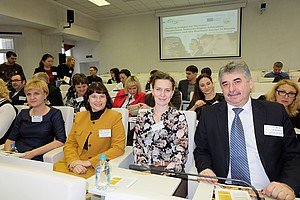
Academic Staff, 3 months - WS 2015 and WS 2016 at Warsaw University of Life Sciences WULS – SGGW
Scientific performance: One of the international projects of our university is the international course "MBA-Agribusiness". I am involved in it as a manager of the program as well as coordinator and teacher of the module "Human Resource Management (HRM)". I knew about successful experience of WULS in the organization of the MBA course and met Prof. Edward Majewskij at the Conferences and Board meetings of the AGRIMBA-network. I decided to apply for the IAMONET-RU project to study the experience of WULS in organization of the MBA course, to get an experience of HRM-teaching and to obtain information for the handbook in HRM. Because of my university duties it is difficult to be out of the office 1 month and it was very important for me that it was allowed to divide my mobility in 2 parts (2 weeks in 2015 and 2 weeks in 2016). Both stays in WULS were very fruitful:
Summary of the activities during the 1st and 2nd weeks would include: meetings with WULS professors and visiting lectures, discussing teaching materials and teaching methods, obtaining and study information for the handbook in HRM, selection of the content for the handbook in HRM, writing an article in HRM (published in Armenia (Scientific conference in Armenian National Agrarian University in 2016)), presentation about the development of agribusiness in Belgorod Region.
Summary of the activities during the 3rd and 4th weeks would include: participation in the conference "20 years of the MBA Program in Agribusiness Management at the Warsaw University of Life Sciences", participation in the AGRIMBA Board Meeting 2016, meetings with professors from universities of AGRIMBA-network (The Netherland, United Kingdom, Poland, Hungary, Croatia), discussing MBA strategy, teaching methods, teaching materials, obtaining case studies for the handbook in HRM, discussing opportunity for the publishing of the handbook in HRM, writing articles in Human Resource Management (sent for publishing in Tajikistan (Scientific conference carried out in Tajik National Agricultural University and Russian Scientific Journal "Omega science", writing an article in Quality Management of Vocational Education and Training (sent for publishing in APSTRACT), preparation of the presentation for the IAMONET conference "Building bridges for Success - Cooperation between Higher education Institutions and the Business Sector in Russia".
During both stays I had my working place with PC and all the office facilities and access to the MBA study materials on the website. Moreover, teaching staff of the faculty provided me their private books published most recent. Prof. Edward Majewskij arranged for me meetings to get acquainted with other faculties of WULS. As a result of new contacts Alexandra Gorecka from WULS taught Logistics in our MBA course in November 2015, the delegation of our university leaded by rector visited WULS in April 2016 and we would like to develop our cooperation. Personal Aspects: because of my administrative duties at the university there is always lack of time for personal development as a teacher and writing papers.
IAMONET mobility gave me an unique opportunity to dip into the academic environment and scientific atmosphere, which created opportunities for development of my professional skills (I taught HRM in English at the MBA course in Slovak University of Agriculture in Nitra in April 2016 using presentations and teaching materials prepared in cooperation with WULS colleagues during and after first part of my mobility in WULS) as well as inspiration for creating new ideas, writing papers and future scientific research. During my stay I have got only positive impressions of WULS, its staff and polish hospitality. For sure, I would apply again for IAMONET.
Academic Staff, 3 months - WS 2014-2015 at the University of Hohenheim
During my stay at the University of Hohenheim, the substrates of animal origin from Russia were examined with the help of Hohenheim biogas outcome test. The results were compared with corresponding indicators from Germany. Besides that, I took part in the research "Cellulose decomposition", which is a part of the project "Development of sensor technology and the learning of principles of load-resistant control systems of intermediate metabolic products in two-phase biogas installations, taking into account full substrate utilization ". The goal was the investigation of fiber degradation with the help of Shiitake fungi.
The host school provided the following: workplace and housing, scientific assistants, laboratory equipment, entrance tickets for events, counseling, technical literature and lectures. I could always turn to my tutor. Other employees of the institute also supported me in my work. During my stay, I attended the international conference "Progress in Biogas" (Stuttgart), the exhibitions "Euro Tier" and "Energy Decentral" (Hanover), as well as the ball under the harvest crown (Hohenheim).
The following differences in scientific work at my guest and home university are particularly noticeable to me:
1. In Hohenheim, since the first year of study, students have an opportunity to work scientifically and to earn money (student assistant).
2. Many doctoral students and master students participate in big scientific projects.
3. A lot of doctoral students and students, who are academically active, are from all over the world.
4. Good theoretical and practical science base.
Thanks to the IAMONET scholarship, I carried out the research for my doctoral thesis, established professional contacts with companies and received information about them, received proposals for the equipment of a biogas laboratory at my home university and improved my German skills. I was able to do my research in a modern laboratory, to work with experienced experts, to get advice from them, to gain practical experience in scientific and linguistic areas as well as to get to know the culture of Germany and other countries (not only during travels but also during communication with foreign students and doctoral students). Disadvantage: the stay was a bit short to prepare a scientific article. I would like to apply again for IAMONET or for a similar program.
Academic Staff, 3 months - SS 2016 at the University of Udine
In 2016 I passed my 3-month academic staff mobility at the University of Udine, Italy. One should notice that I already did my postdoc here in 2008, and therefore this mobility helped me to extend and support scientific contacts. During my 3-month stay in Italy I was involved in a few research projects carried out at the Department of agricultural, food, environmental and animal sciences of the University of Udine.
Particularly, I conducted researches (under laboratory conditions) on developing of phenological model of the European grapevine moth (Lobesia botrana), which is the key pest of grapevine both in Italy and Russia. We found that under variable temperature conditions its development occurs faster, than under constant temperature conditions. These results were presented at the International conference at my University in December 2016. A scientific paper on this subject is expected to be published.
Together with my Italian colleagues I worked in vineyards in the Friuli region so as to perform monitoring of some key pests of grapevine. This work allowed me to learn new methods of plant protection and to know more about modern equipment and research techniques. We also visited some sites with outbreaks of the brown marmorated stink bug (Halyomorpha halys), which is a new invasive pest both for the European Union and Russia. I made a first record of this pest in the Southern Russia in 2014, and therefore it was very important and interesting to know how is this pest being monitored and controlled in Italy.
During field excursions I took a number of photographs of pests and performed scouting techniques; they all are used in my teaching and research work. I also shared our experience of testing new foil-polyethylene pheromone dispensers that were developed by our research team in Russia in 2004-2015. Some dispensers and pheromone traps produced in Russia were taken to Italy and tested in the Friuli region for the first time in 2016. As an example of my didactic work, I passed some textbooks to my Italian colleagues. The remarks made by my colleagues were taken into account when I worked on the further editions of these books, and as an outcome of the mobility, the second edition of my "English-Russian terminological dictionary and handbook on plant protection" was released in 2017 (Saint-Petersburg: "Lan" Publishing house, 2017: 392 p.).
At the Department of agricultural, food, environmental and animal sciences I found a really warm and comfortable atmosphere that allowed me to work in good conditions. The most positive result of my mobility at the University of Udine is my experience of working in an international research team. It was interesting to meet researches of other nationalities (e.g. from Iran and Croatia). Apart from scientific benefits, I've grown culturally, since I had an opportunity to know more about Italian culture and traditions. I established not only professional contacts but also friendly relations with my Italian colleagues.
All in all, participation at the IAMONET-RU V project was a great experience for me at the professional and cultural levels and I would apply for this project again. Finally, I would like to thank all members of staff from the University of Udine, University of Hohenheim and the Russian State Agrarian University - Moscow Timiryazev Agricultural Academy, who had been involved in supporting and providing my individual mobility. Thank you very much indeed!
Academic Staff, 1 month - WS 2016-2017 at the University of Natural Resources and Life Sciences, Vienna
My name is Elena Zagorulko. I work at the International Department at Belgorod State Agricultural University, Russia. New knowledge, steady development and foreign languages are very important in my work. That's why every professional person should regularly refresh and renew his competences. I participated in the IAMONET-RU as Academic Staff in 2016 and had my mobility at the University of Natural Resources and Life Sciences, Vienna, Austria.
My mobility included two parts. On the one hand I observed the working life at the International Department and on the other I could visit a German language course.
There are many foreign students in BOKU and thus the International Department has a big well-organized team. Working processes are clearly planned and automated. Meetings and appointments with supervisors, applications for participation in programs, applications for admission, candidates' selection, courses registration / selection, feedbacks - everything is provided through the Internet with the help of special software.
Specialists give specific instructions to freshmen on how to use these recourses. The idea is that freshmen will be able to use them in their further independent work. Training mode and schedules are very flexible at BOKU. Students can independently choose seminars, lectures and exams dates via e-registration. It is great and very convenient! The team of the International Department does their best for their local students as well as for the foreign ones.
As for the second part of my mobility - it was very useful and beneficial to visit the German language course. I could refresh my already existing knowledge but also learn something new. I got ideas about Austrian special dialect and some language peculiarities. Classes were very intense but interesting and enthralling.
Students from different countries discussed modern topics and current problems of their countries in German and shared their knowledge. It was very interesting to meet different people and work together on various challenging tasks.
There were no Russian native speakers in my group and, I believe, it is a very important aspect that contributes to the successful educational process. Our teacher carefully planned every lesson, visually explained grammar material and helped students in their discussions.
I think my staff mobility was great and beneficial in every way. Definitely I would like to repeat this experience again. I have got new knowledge, skills and ideas, which will undoubtedly help in my professional life and further personal development.
Academic Staff, 1 month - WS 2014-2015 at the University of Udine
The field of my scientific work is methods in teaching languages. I passed two different stages of involvement in the teaching process at the University of Udine.
Firstly, I attended some lectures in Russian and English languages, including one about Russian literature. They were held by professors from the linguistic department. The usage of high technologies during the lectures made them more fascinating and dynamic.
I was given the chance to experience the language matter, develop ability to analyze it and comprehend the essence of the complex linguistic problems. I analyzed how the interest in a language and in research on it emerges, dived into the depths of language material.
The second stage included my own lessons in Russian language to undergraduates and young scientists. I prepared presentations and materials on the process of successful public speaking. During my lessons I aimed to present traditional topics as well as the current ones, such as research on cultural diversity, for example. In sum, I attempted to provide students with a broad understanding of the nature of public speaking and specific skills applicable for the Russian language.
Following the results of participation in this program a scientific article on the issues of teaching foreign languages was written and published in co-authorship with Professor Rosanna Giaquinta.
I didn't experience any negative aspects during my mobility, there were only positive ones. For me it was a deep integration in the teaching process and close cooperation with all colleagues of the linguistic department. I believe that the IAMONET-grant and experiences abroad didn't only contribute to my scientific career, but also gave me a great chance to continue my scientific and professional life with new ideas and achievements.

